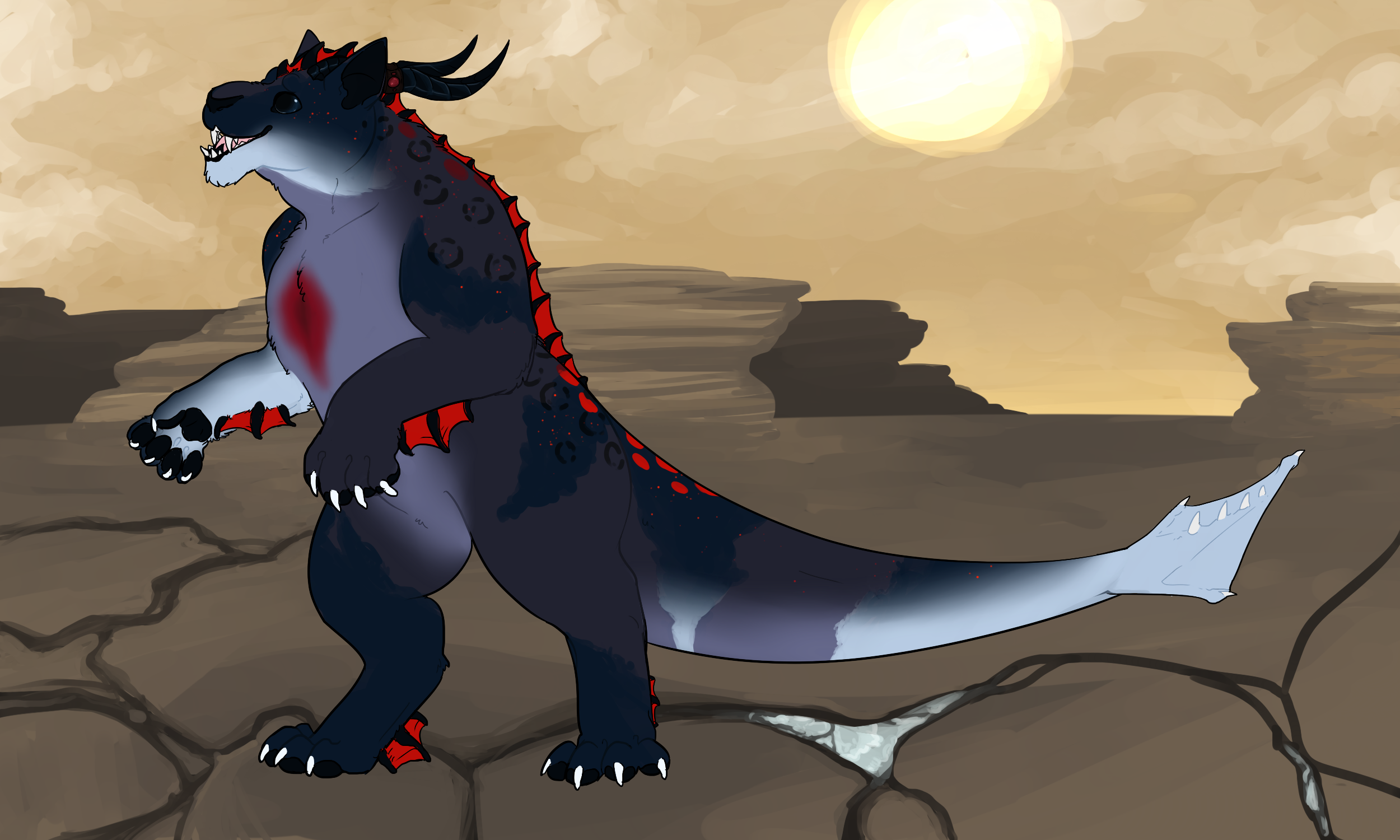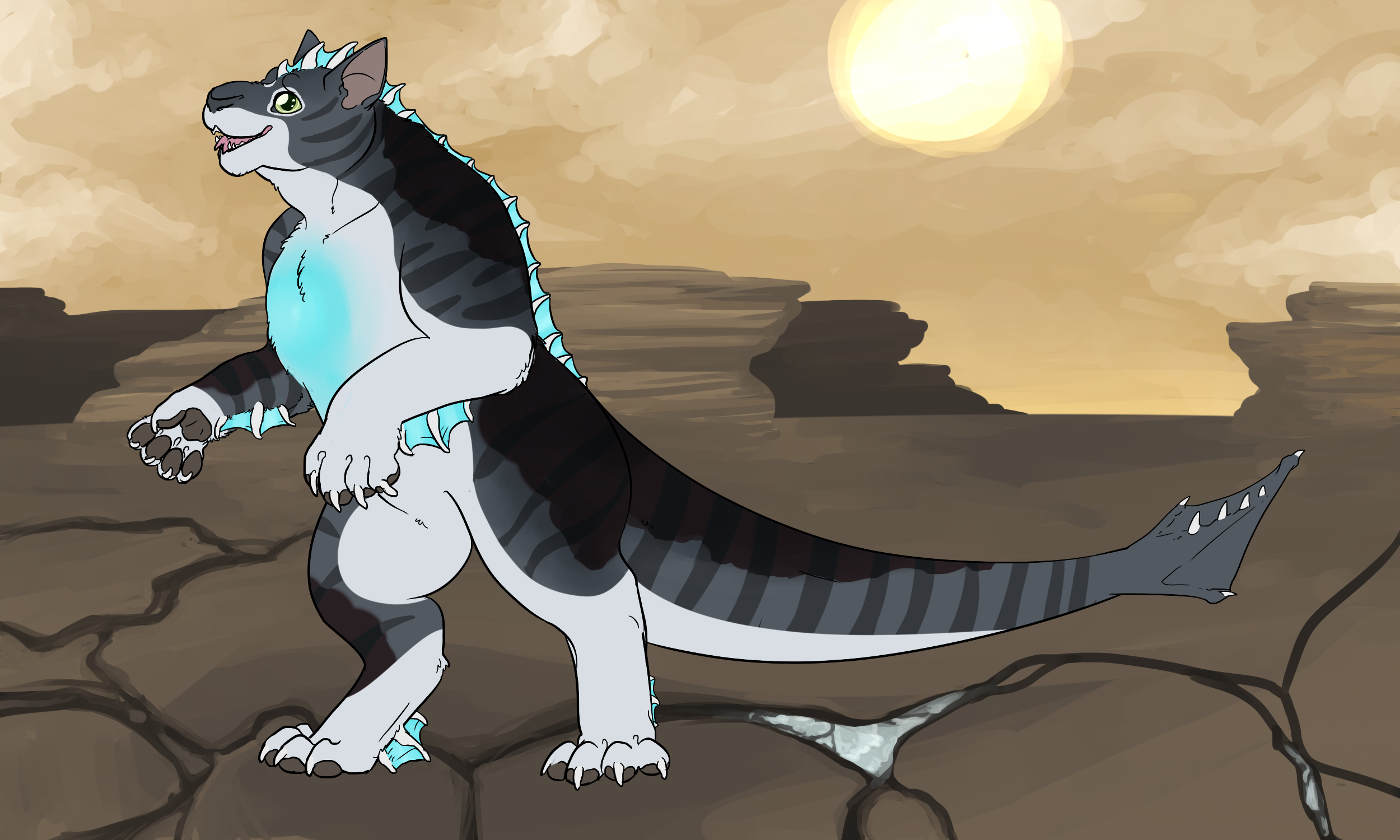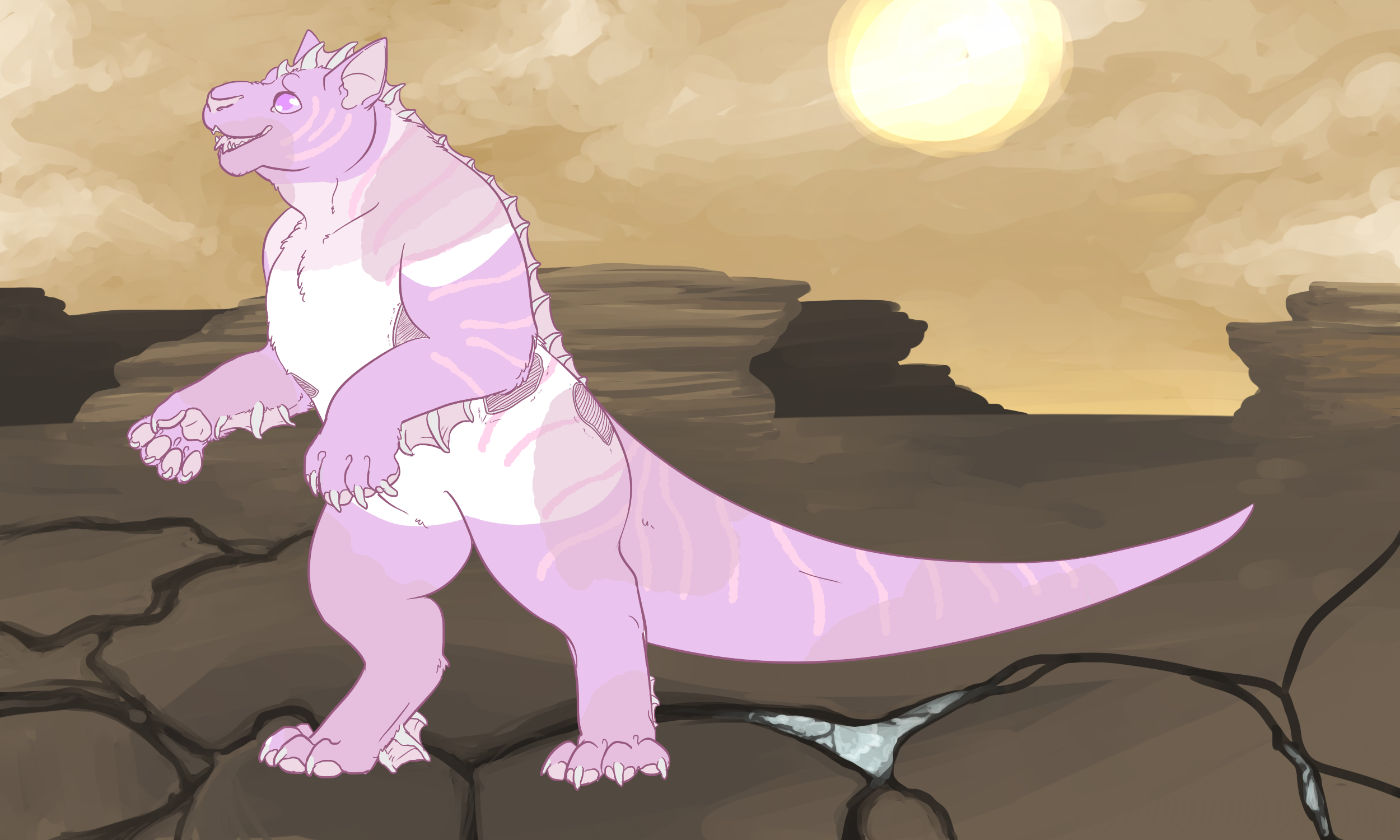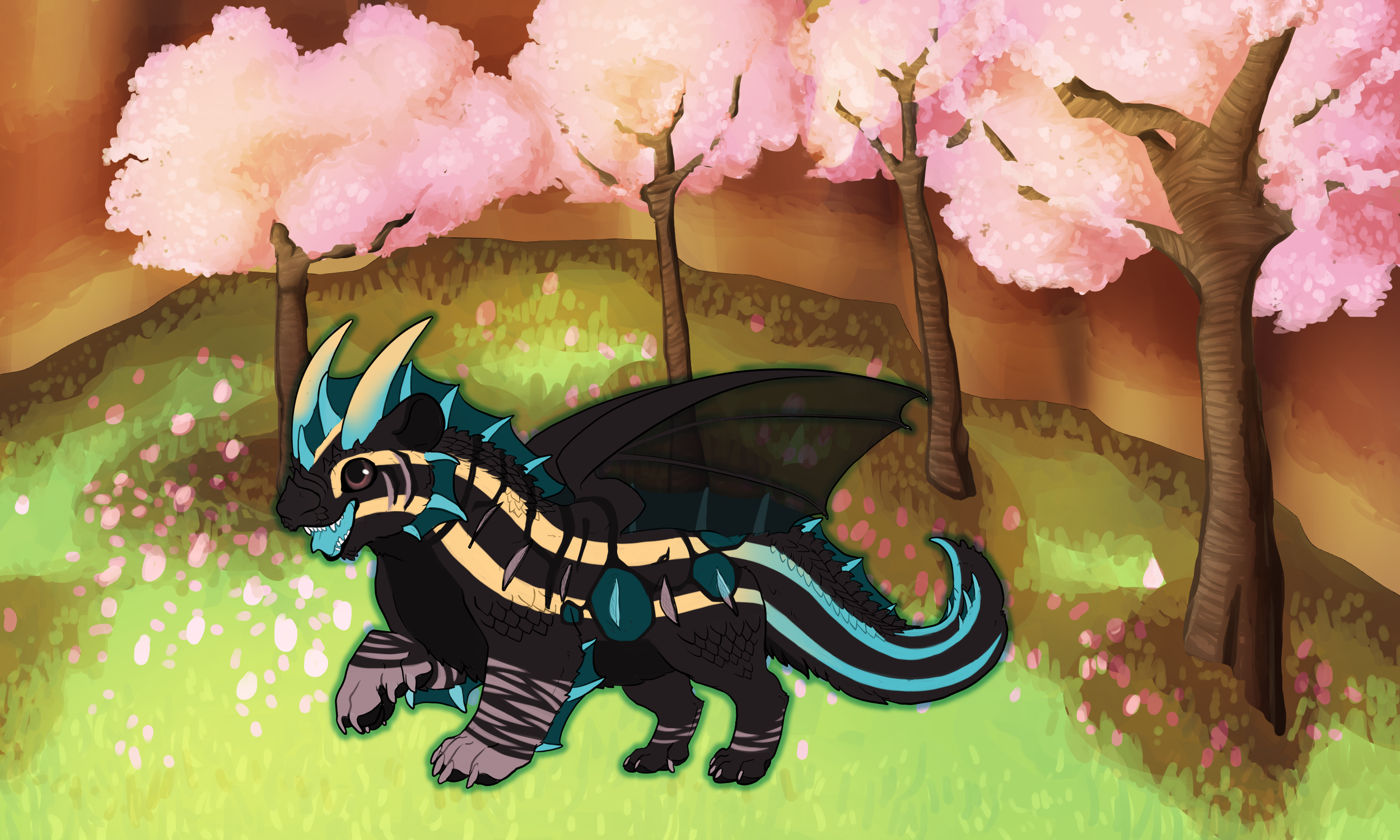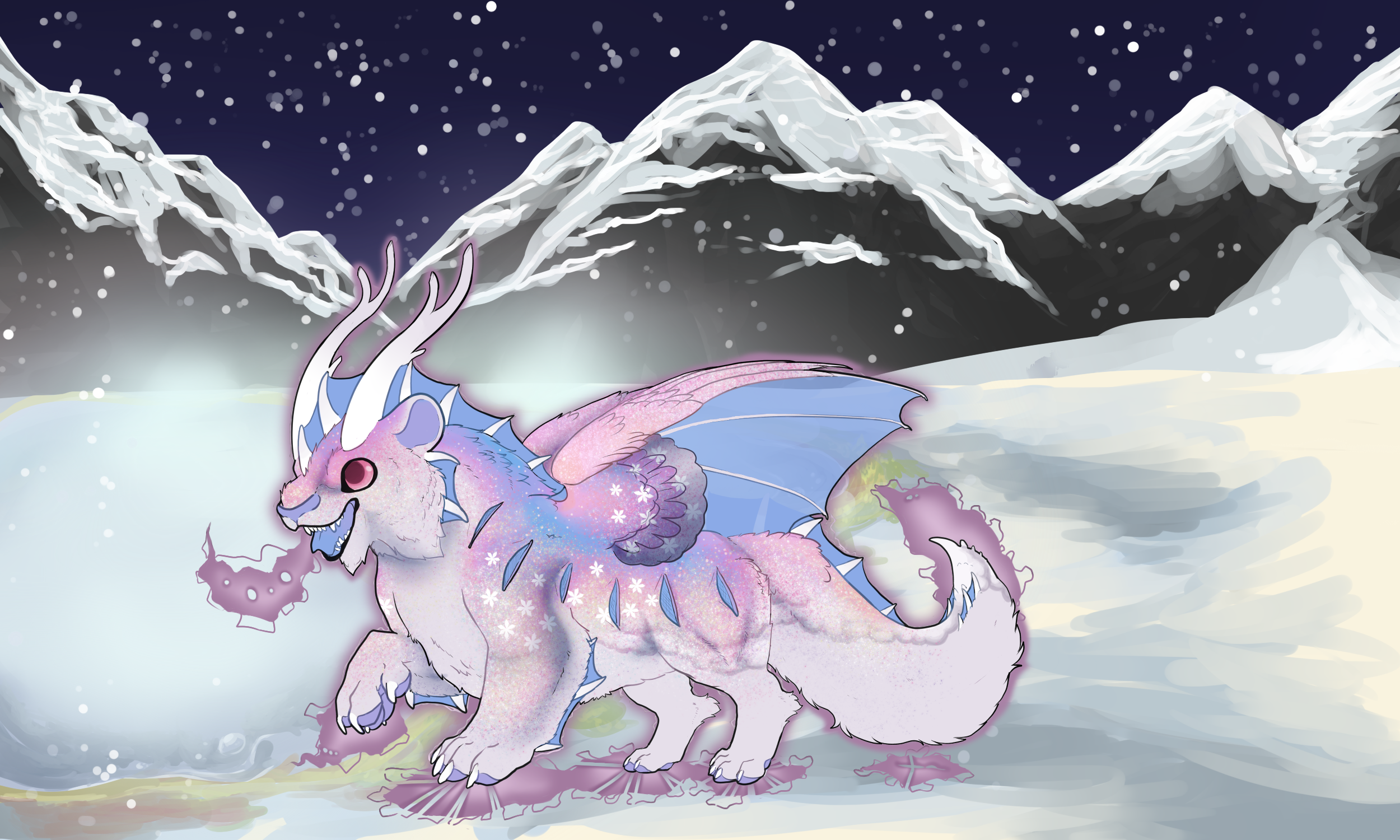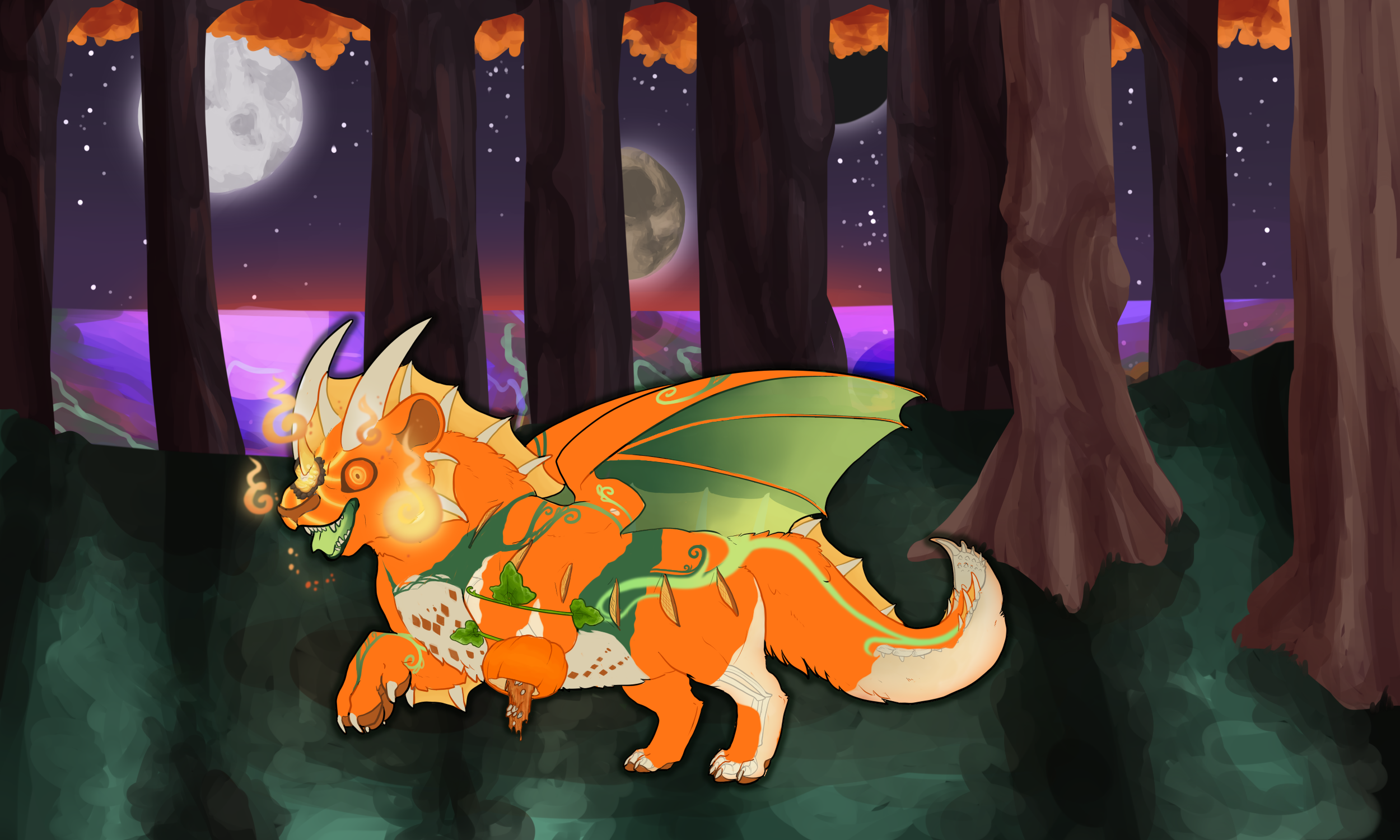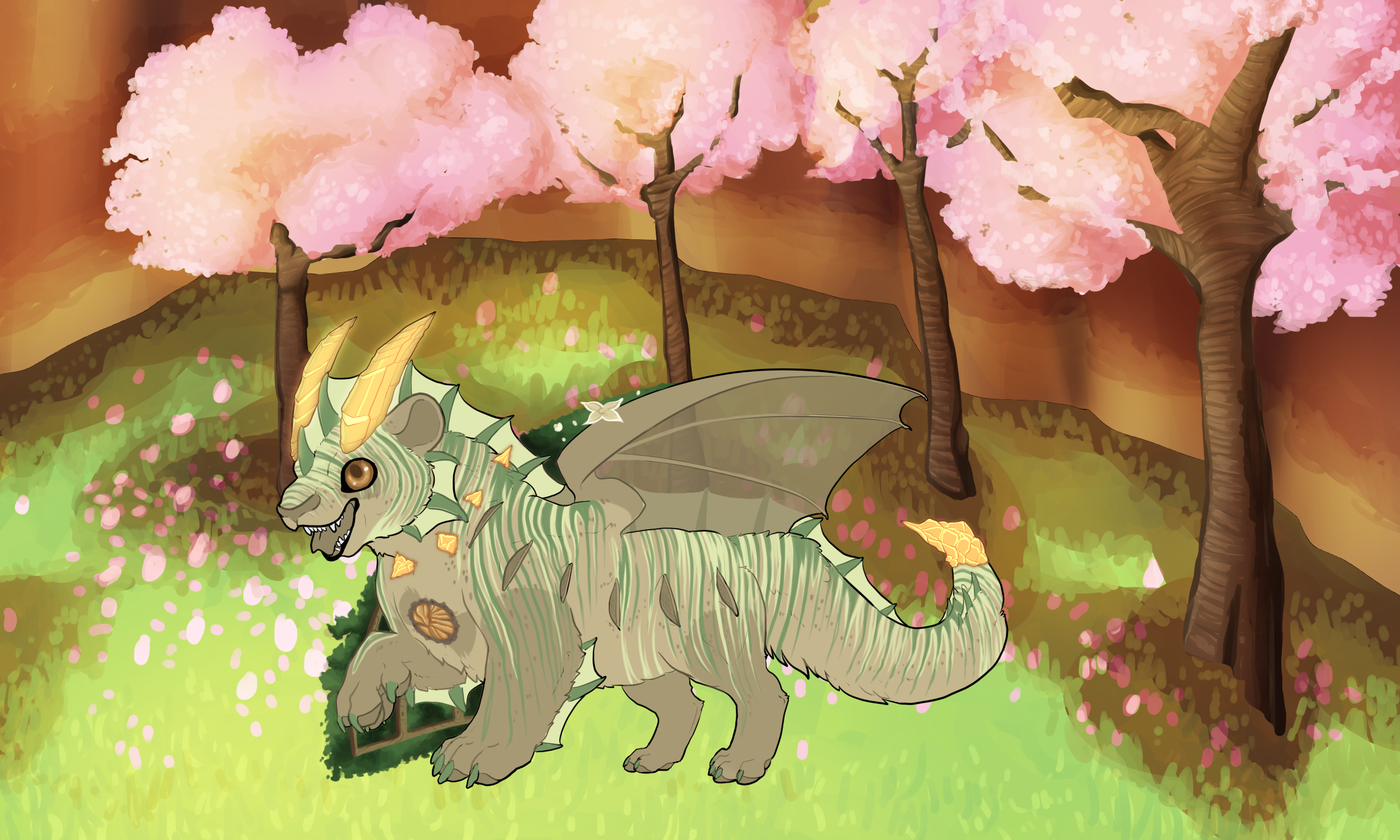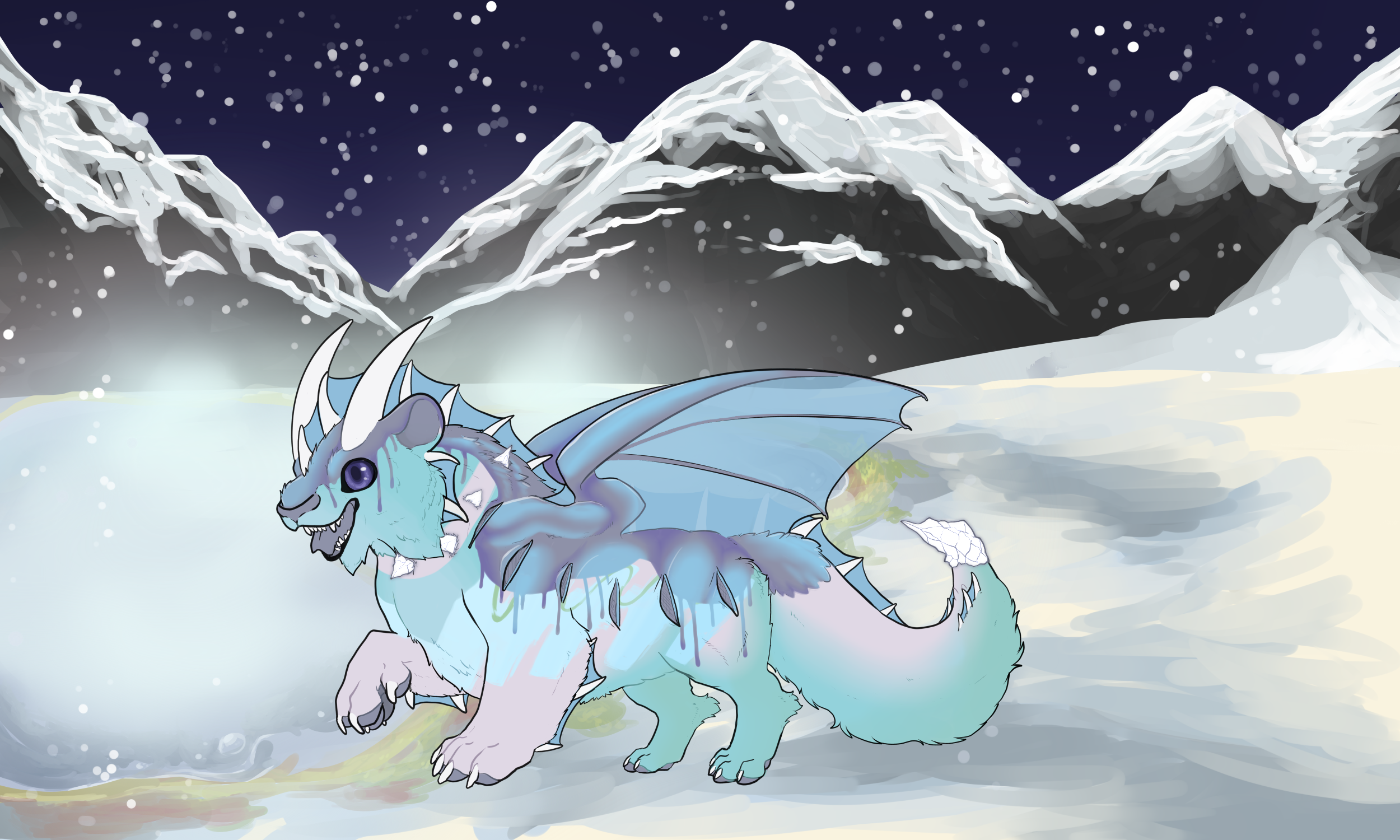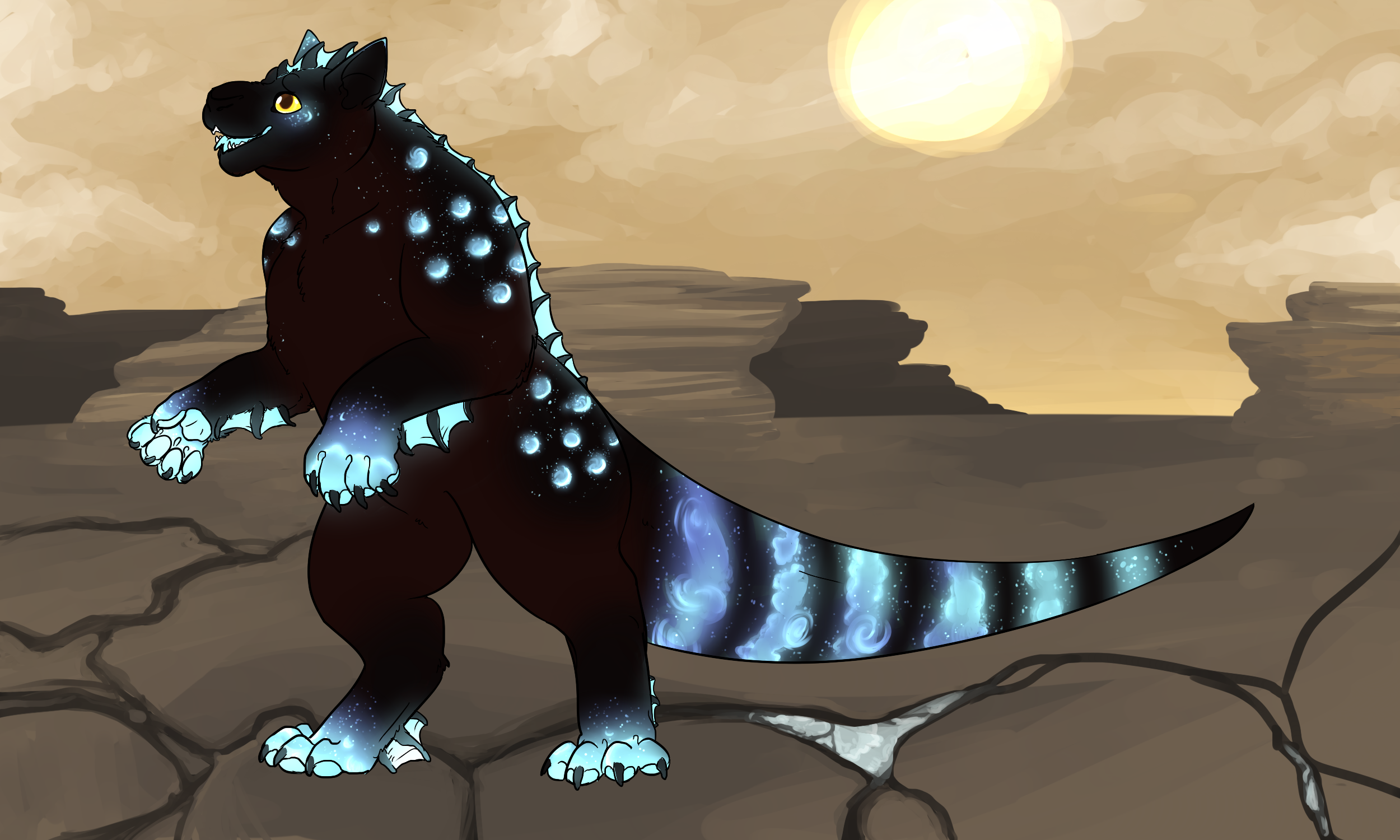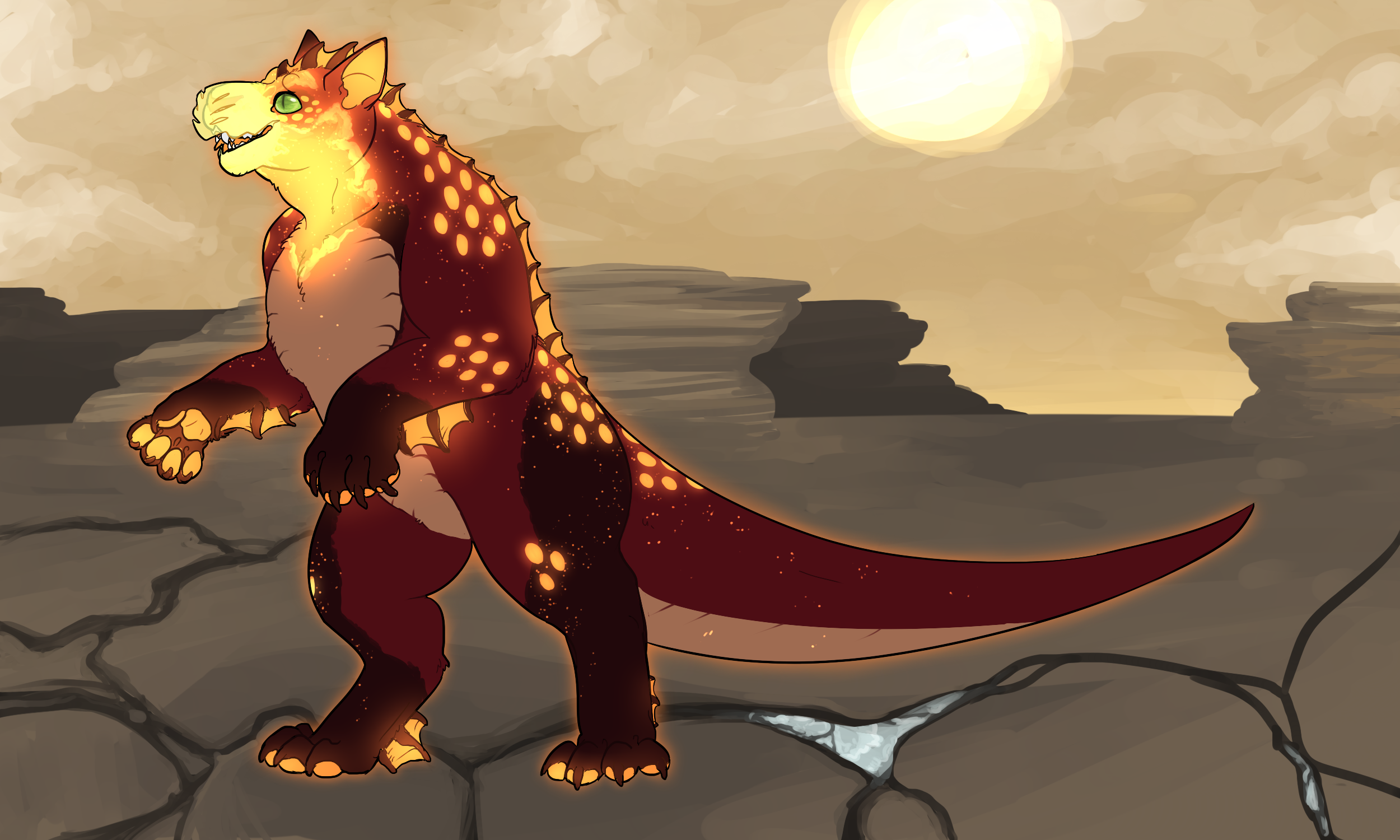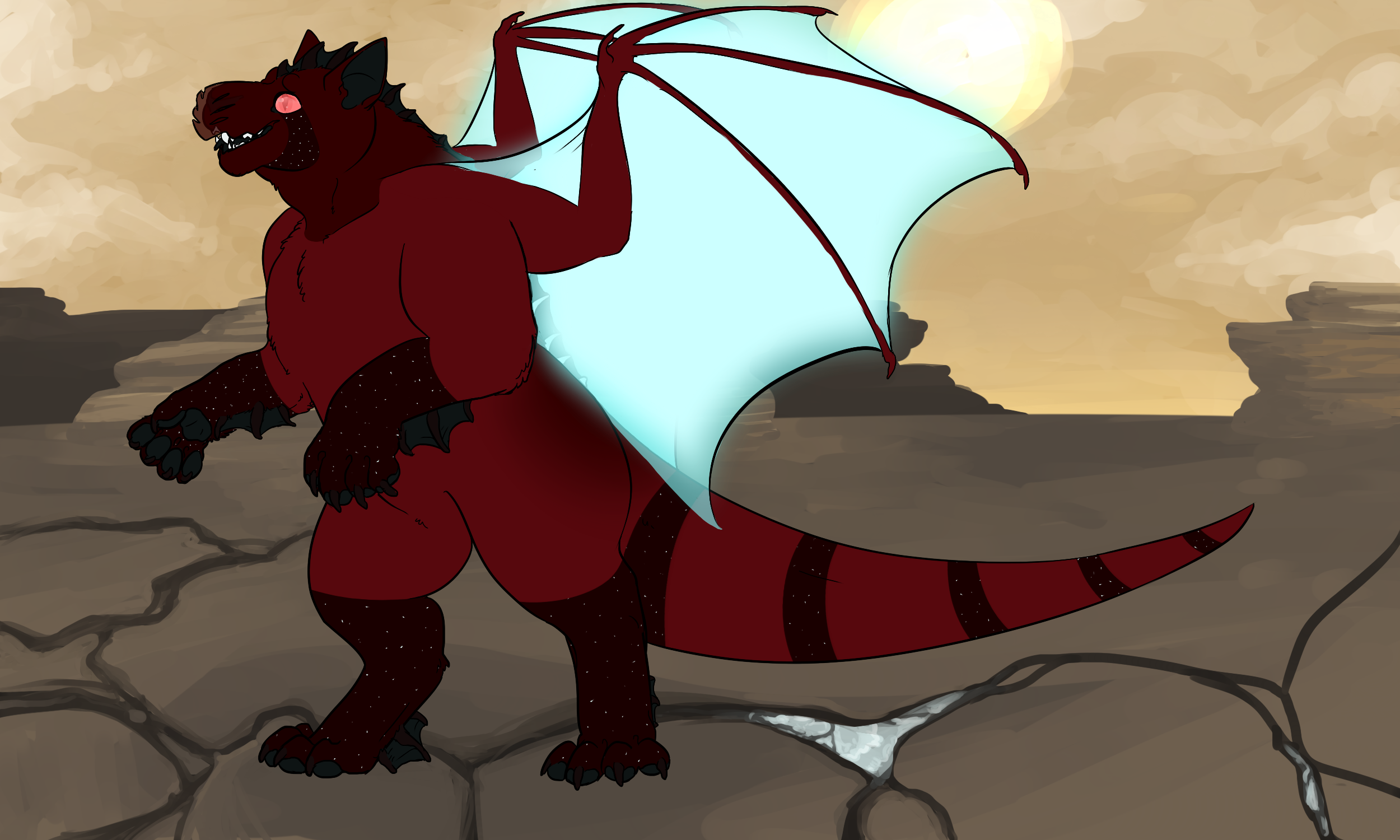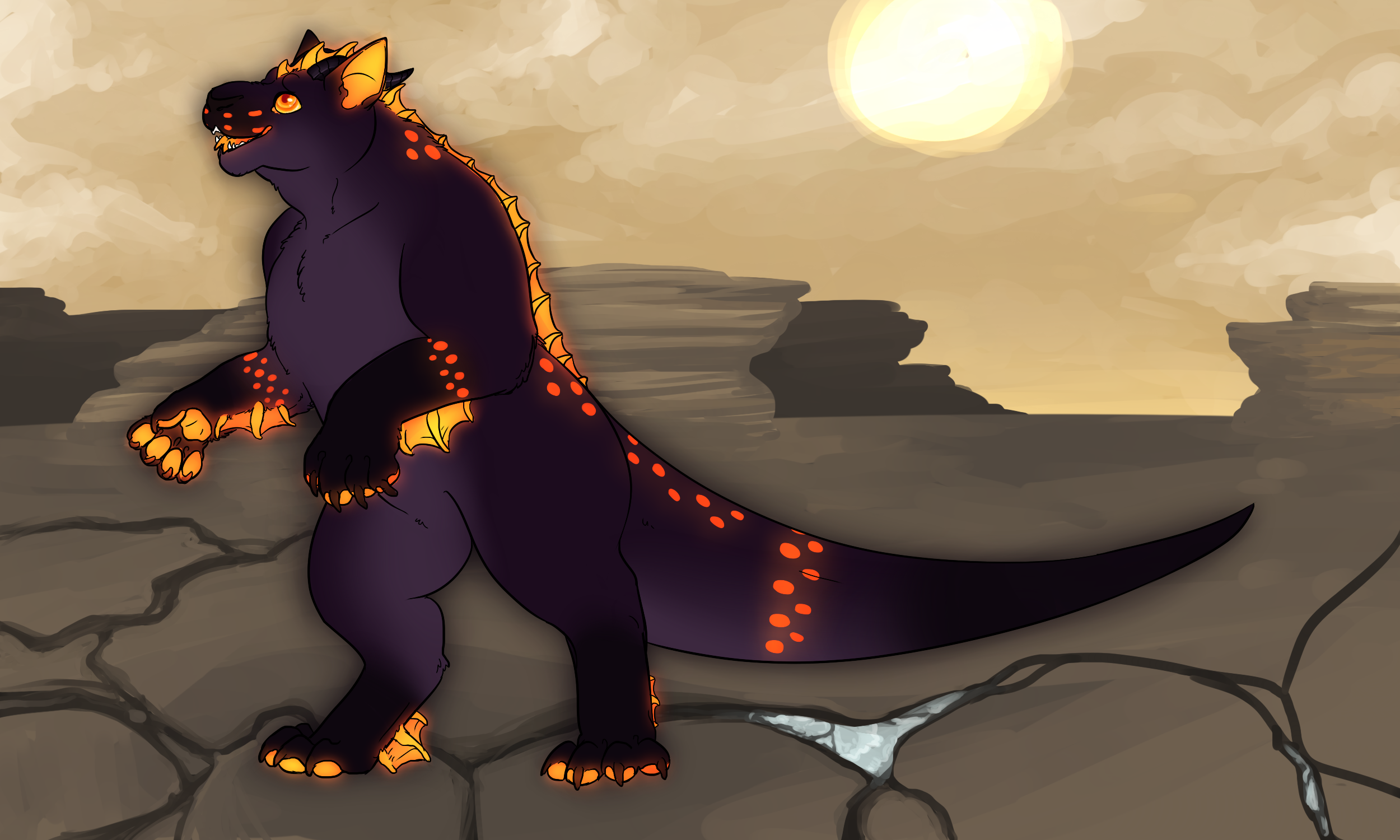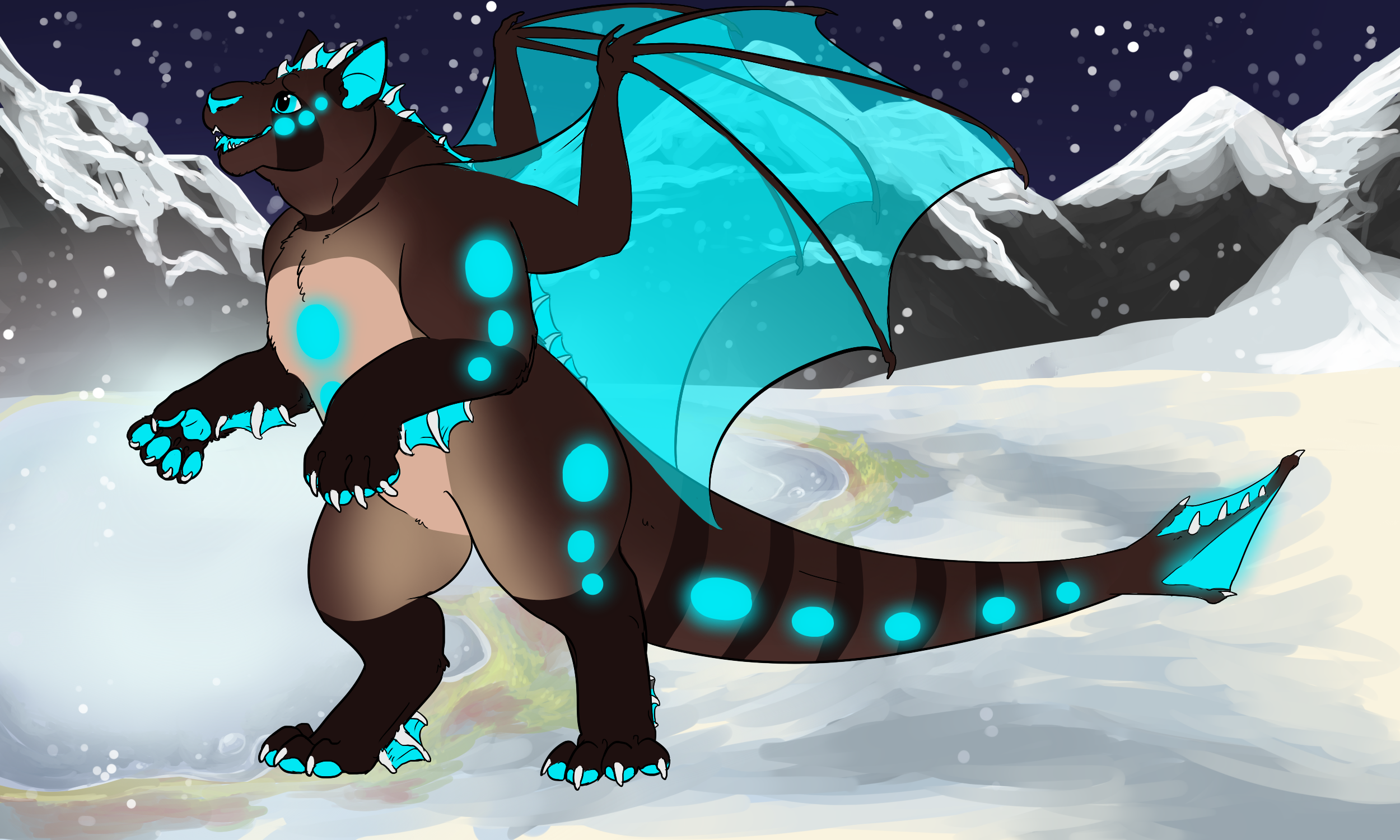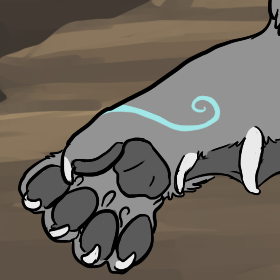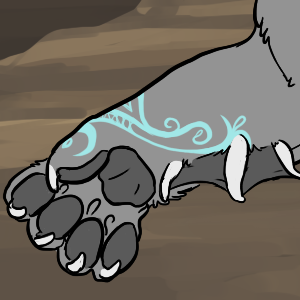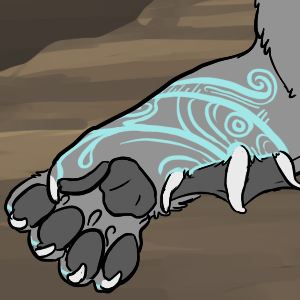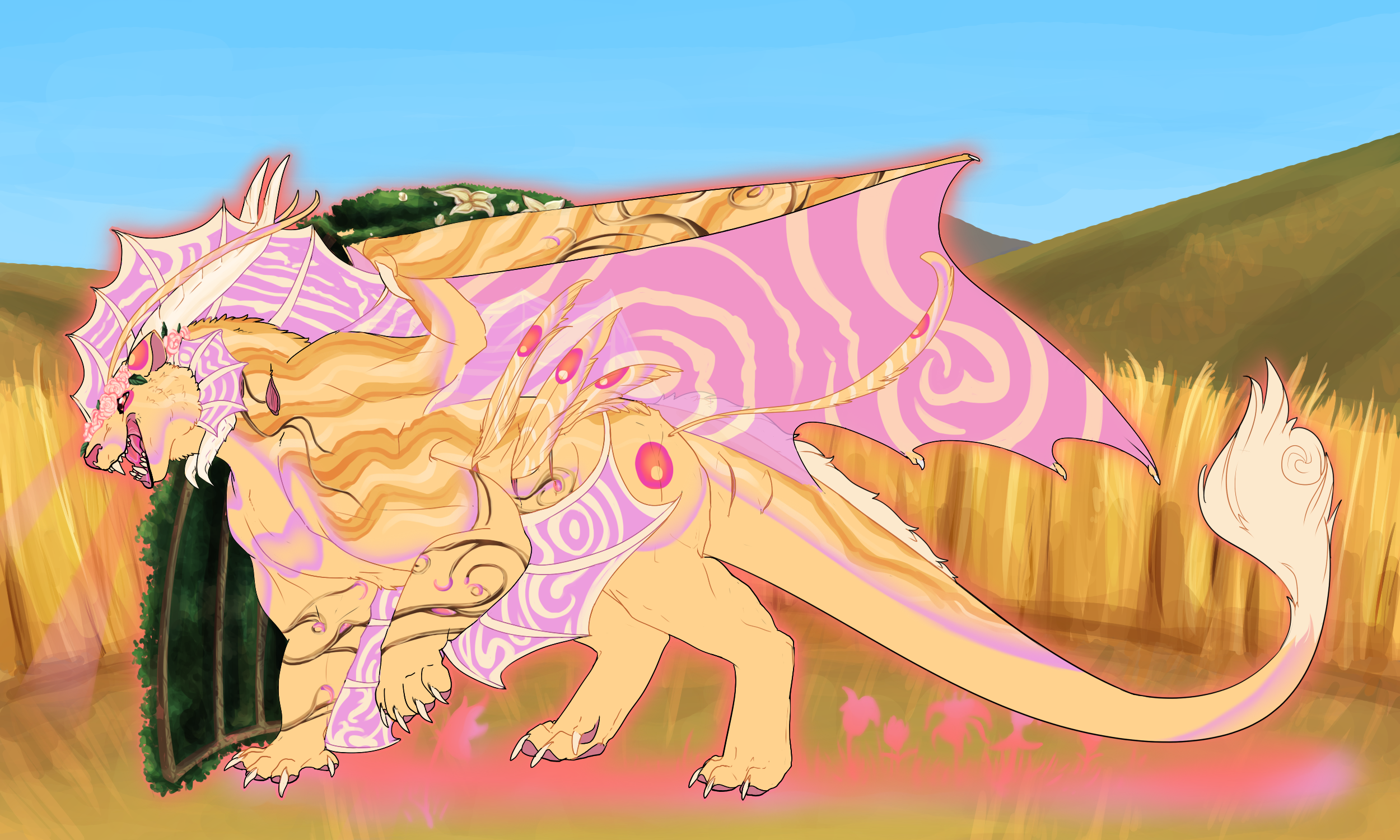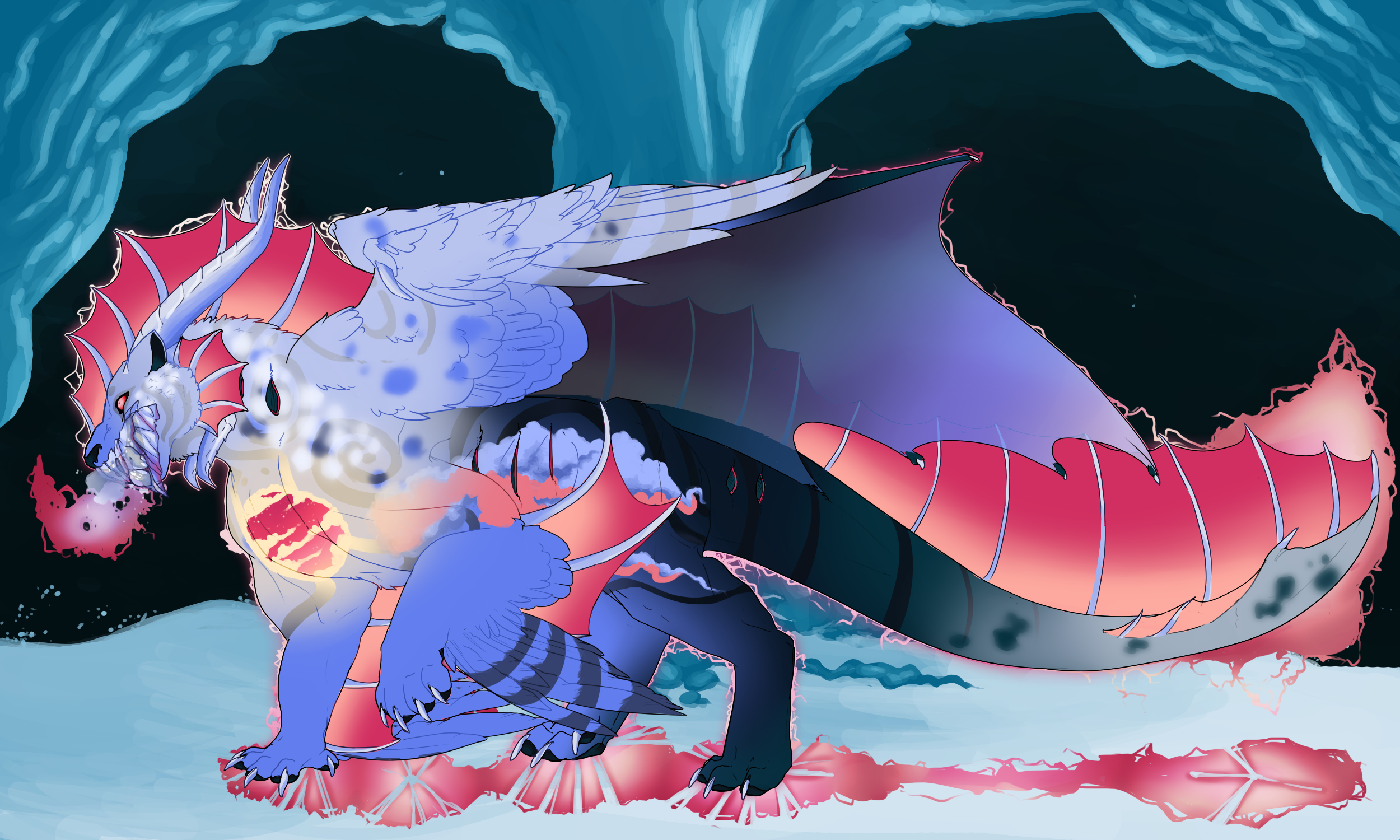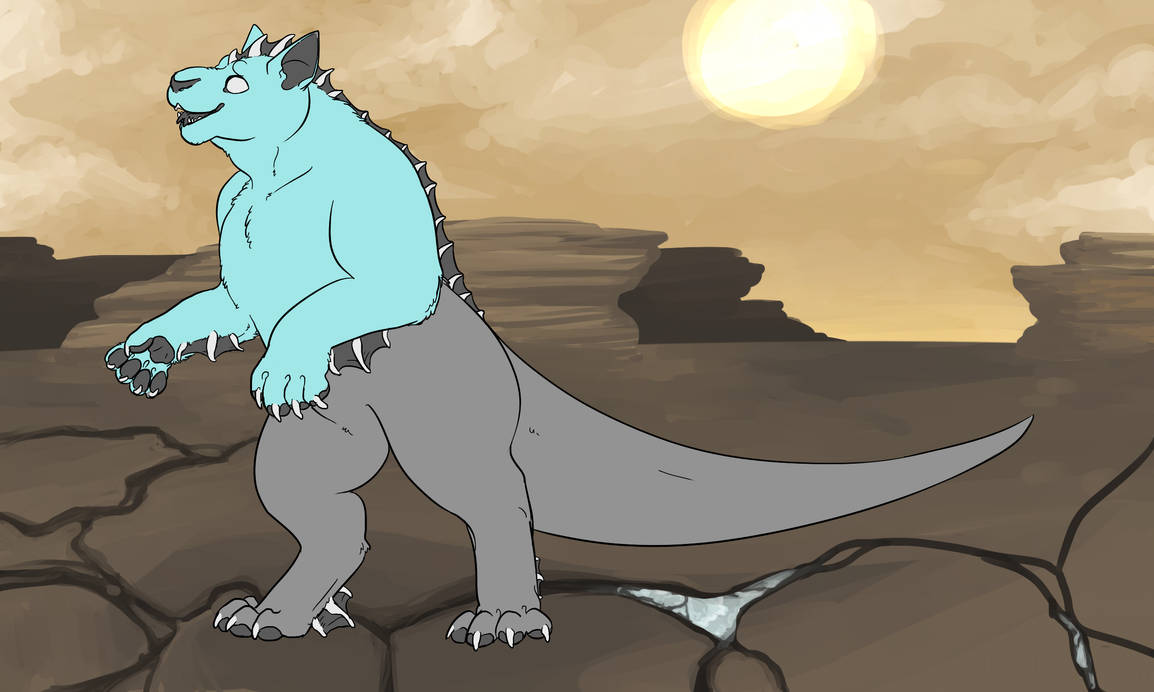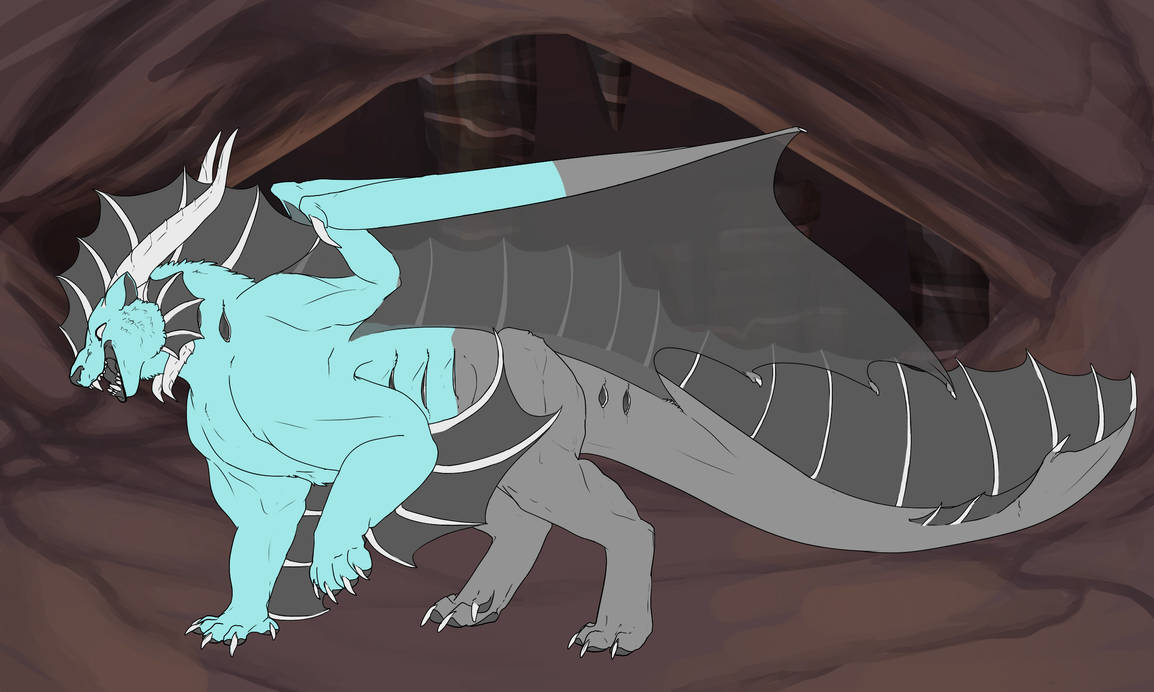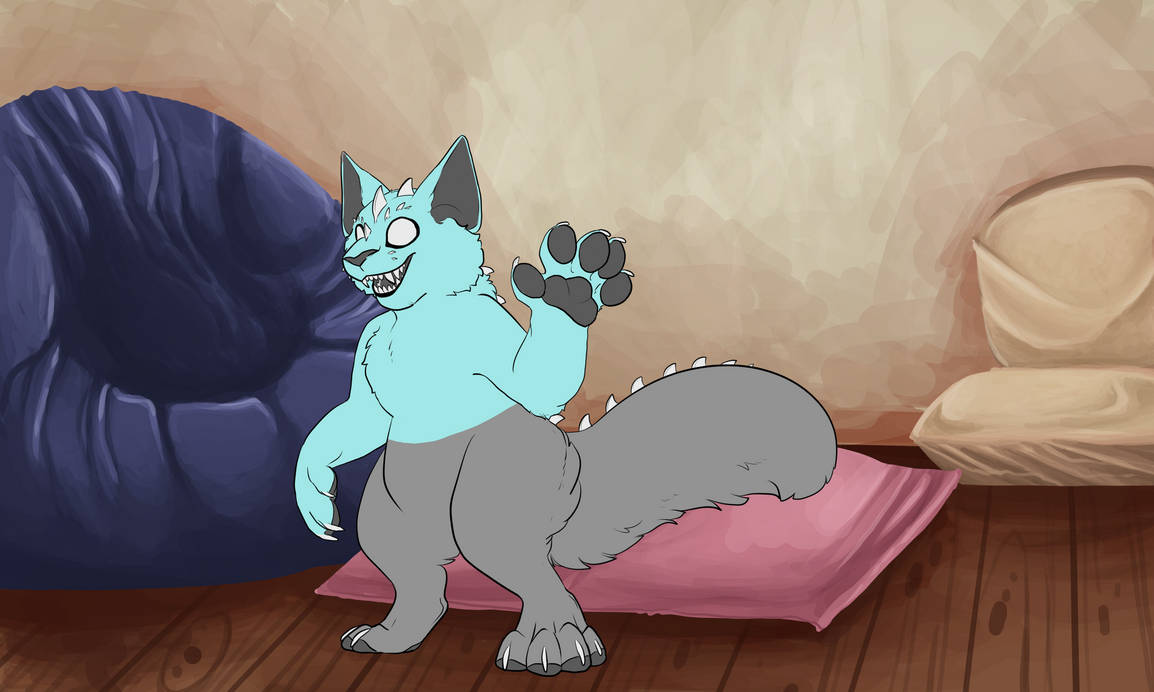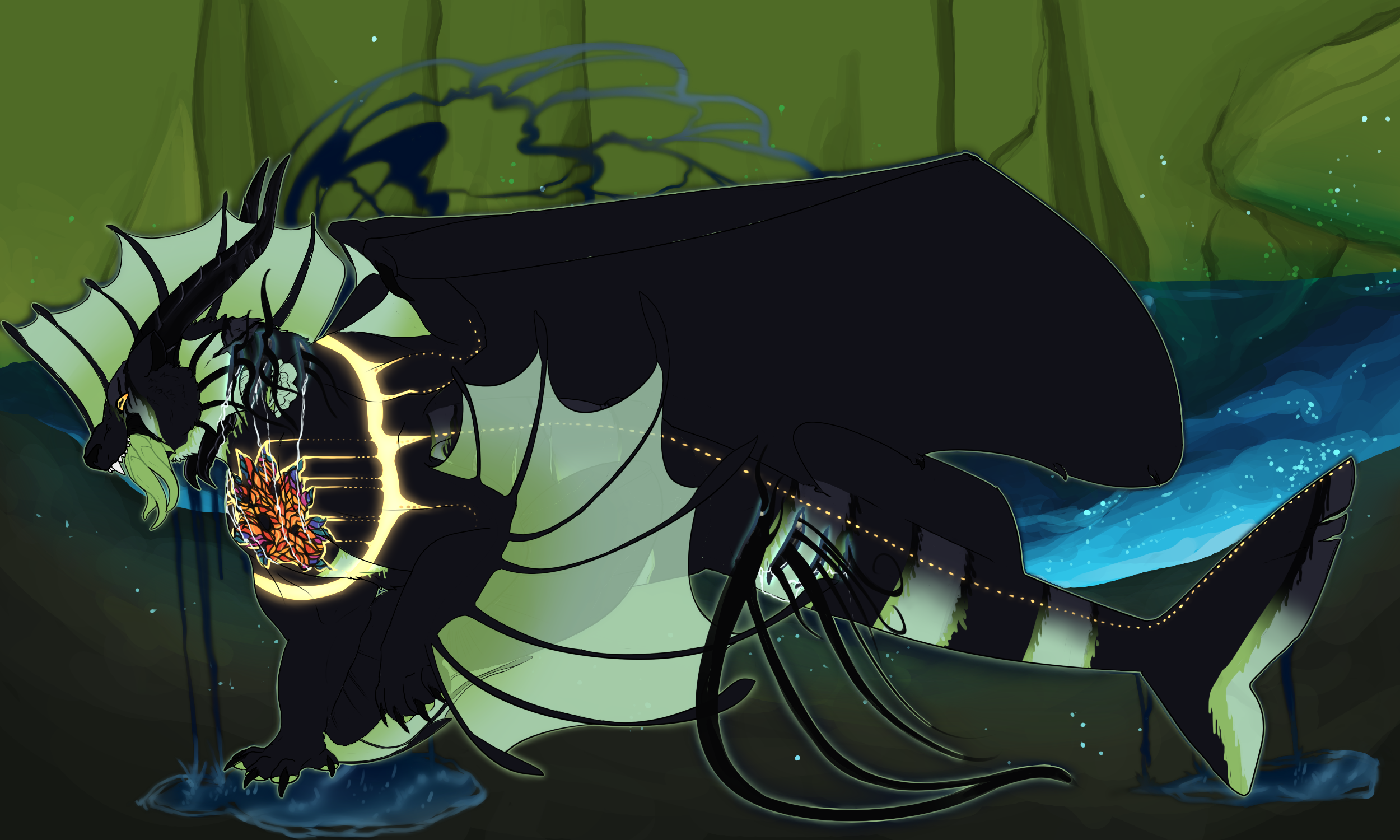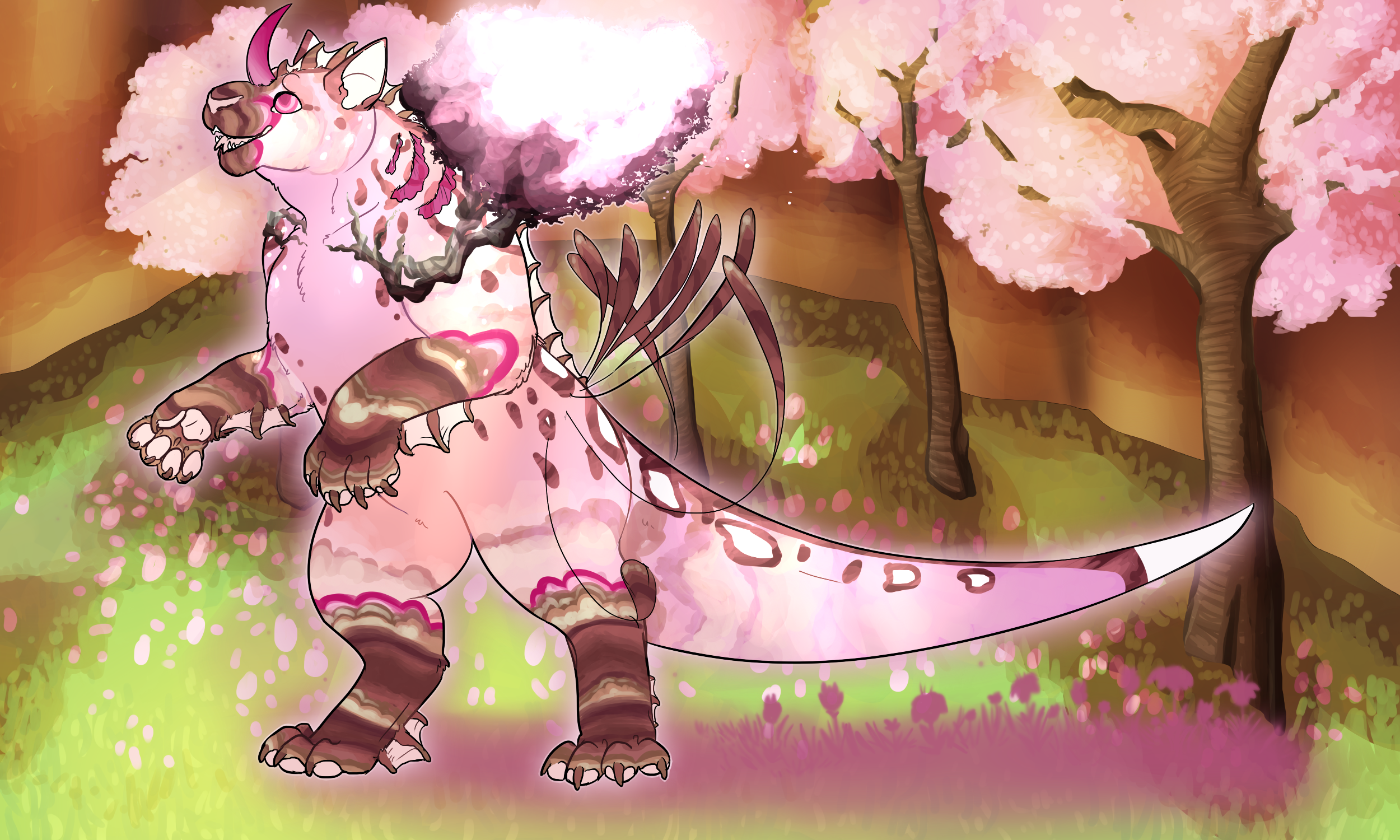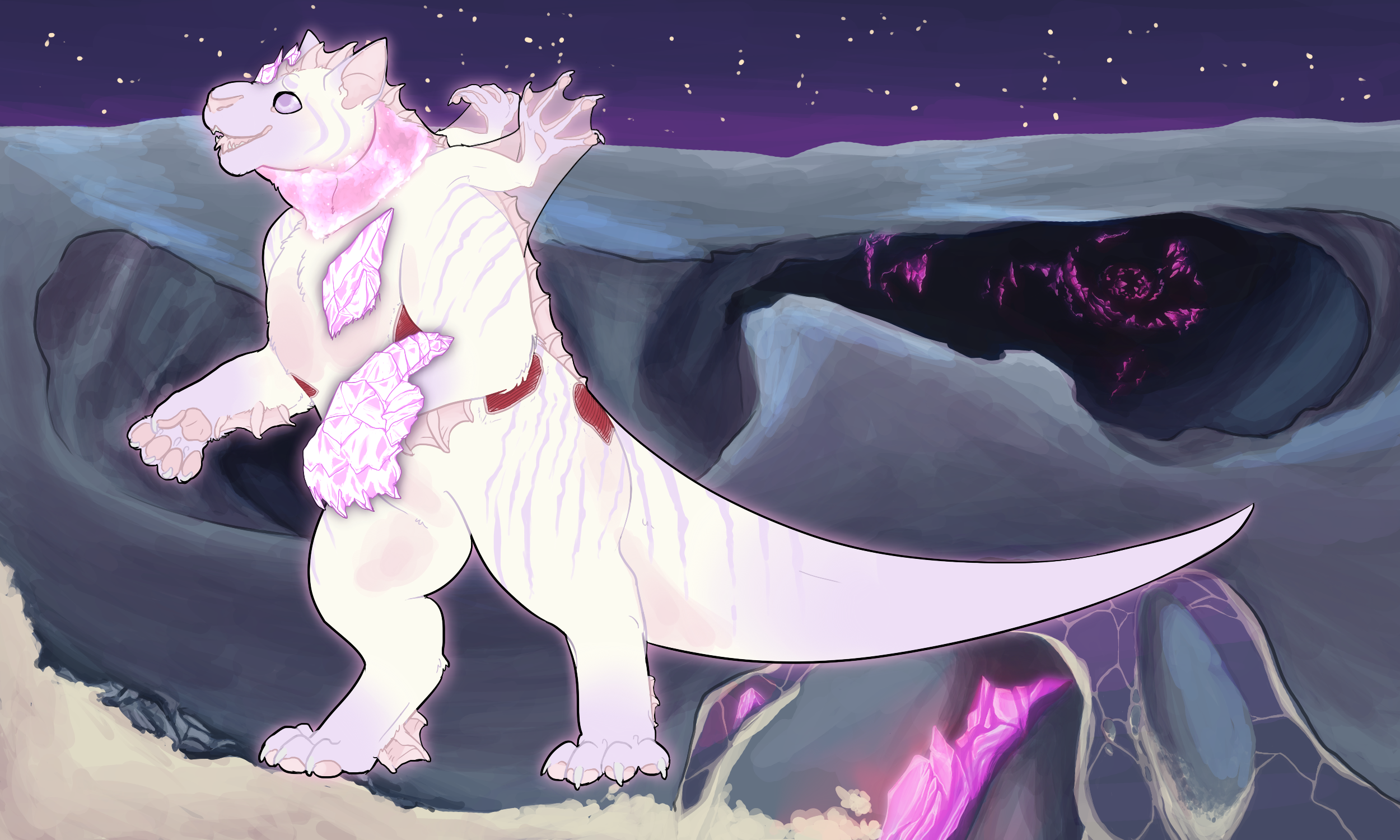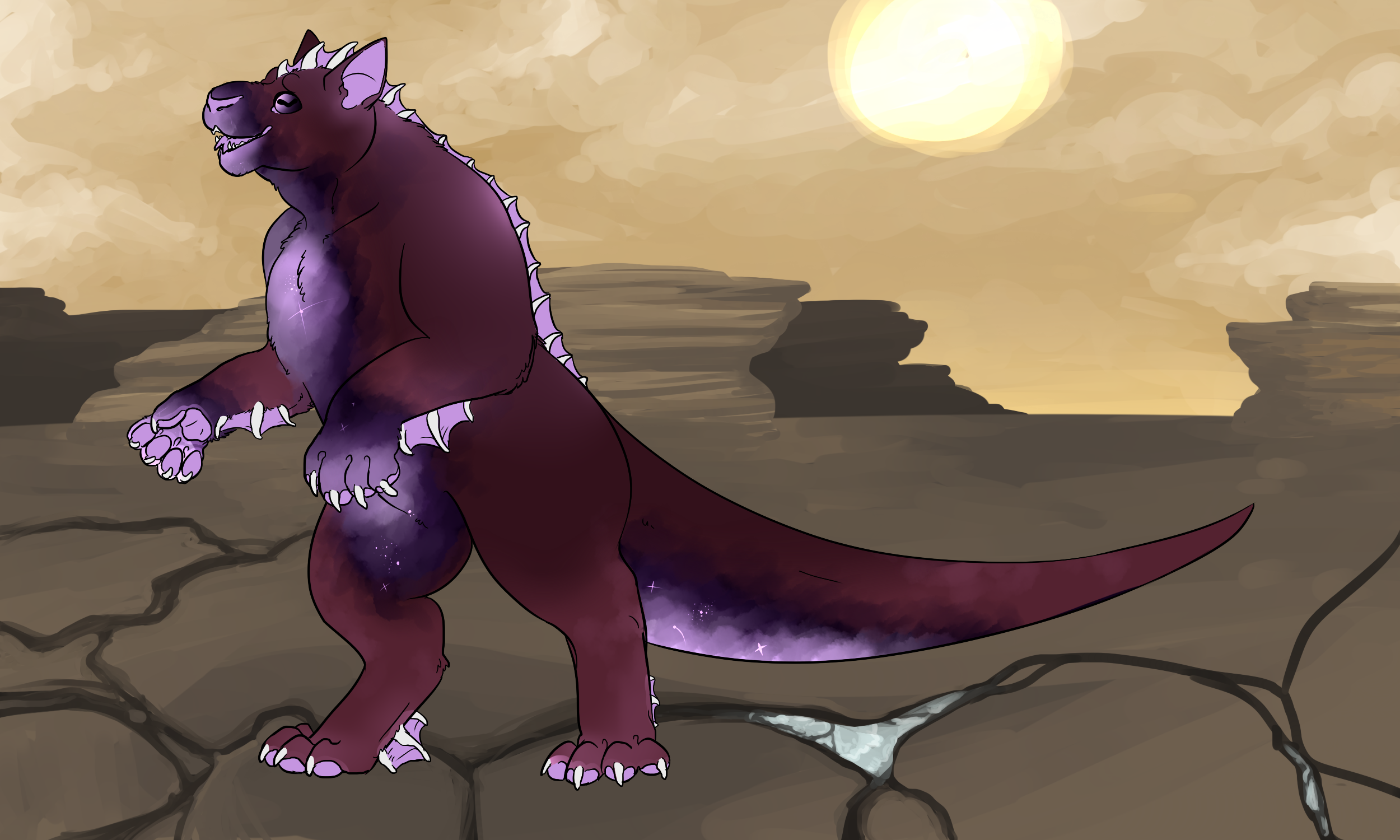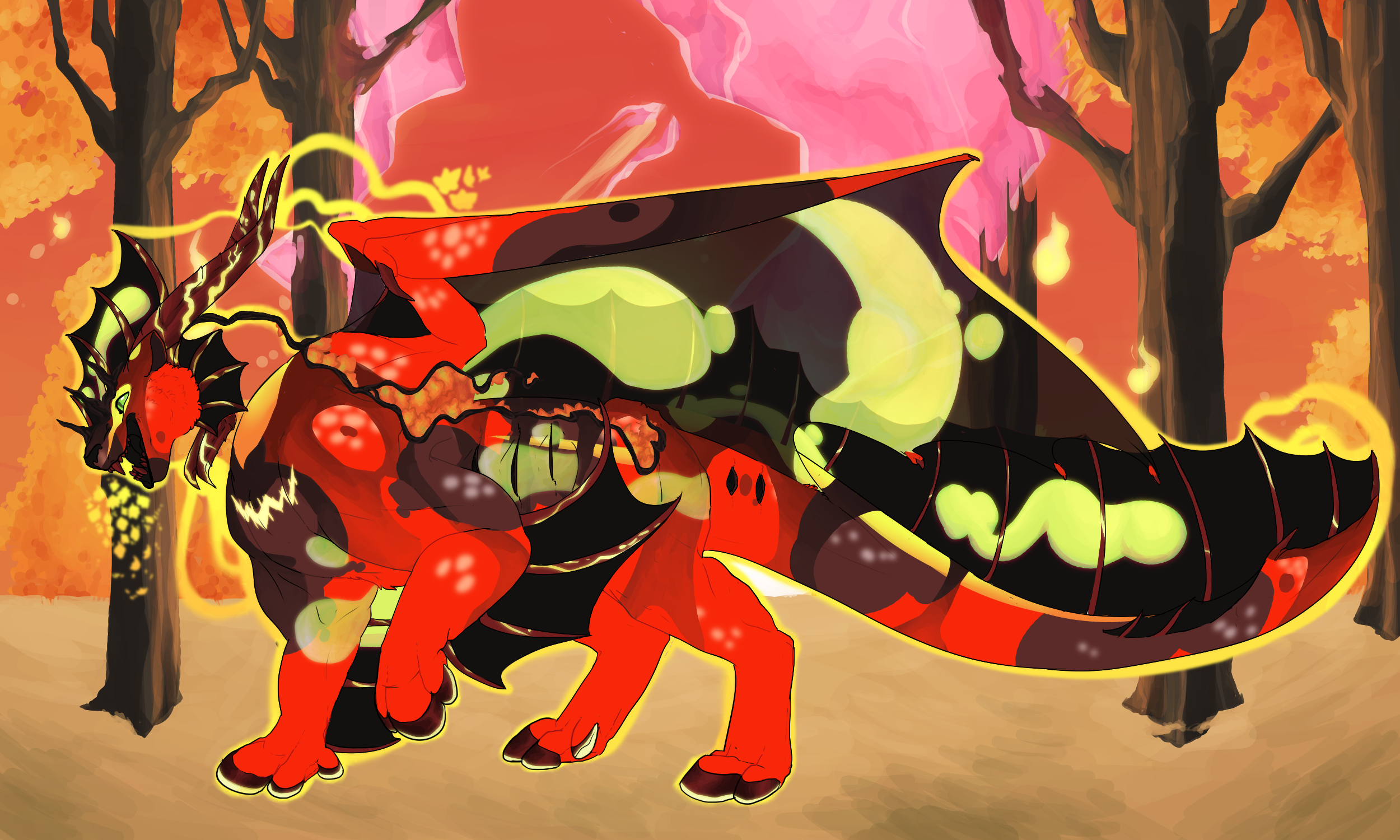Traits
Tortoiseshell (nTrt/TrtTrt) (Rare)
Creates patches of color in a pattern similar to a tortie cat, patches can be any base color. Dominant Tortoiseshell patches can take on two different alternate base coat tones!
- Tortie patterns do not have an edge hardness restriction, but are typically textured.
- Dominant Tortoiseshell can have two different base colors included in Tortie patches instead of just one if the designer so chooses - both must still be picked from base coat swatches! Different colors should appear in different patches - multiple base colors should not appear in the same Tortie patch.
- The patches can appear anywhere on the body and should not cover more than roughly 50% of the Ixi. It shouldn't mimic other markings!
- Other markings can display above or below tortoiseshell.
- If the markings appear above tortoiseshell, they can be color-shifted where they touch the patches - it must still follow the marking's color rules, however! With modifier markings like Glitter and Lunar, this can result in an entirely different modifier color being present on the patches than the color present on the main body.
Examples:
Kintsugi (nKt/KtKt) (Rare)
Creates crackles across the body of the Rixixi, including large jagged pottery cracks, both filled with color. Dominant Kintsugi can go overtop of color mutations.
- Kintsugi can be any color, and may display up to two colors within the marking, which may be blended together. It may have a glittering texture. Dominant Kintsugi also uses two colors maximum, but may optionally display above and unaffected by color mutations like Albinism and Bicolor if desired.
- It should appear as two combined shapes: a streak of color that branches off, as if making a "crack" or "lightning bolt" shape, and also a jagged, geometric spot, like a broken piece removed from the Rixixi and filled in with color. Parts of the marking may resemble Groundbreaking without having to attach to a larger spot as long as these larger pieces do exist.
- It should be hard or textured-edged.
- Kintsugi does not have a maximum or minimum but must be clearly recognizeable.
Examples:
Oil Paint (nPnt/PntPnt) (Rare)
- Oil Paint should generally be an at least slightly irregular shape, but still be recognizeable as a large spot.
- Recessive Oil Paint may be any base color, and should be iridescent. Dominant Oil Paint may be up to three base colors, which can be separated into different spots or gradiented together. It should still be iridescent.
- The spots can appear anywhere on the body. As they are large, they should appear on a minimum of roughly 30% of the body and a maximum of roughly 70%.
- If markings appear above Oil Paint, they can be color-shifted where they touch the spots - it must still follow the marking's color rules, however! With modifier markings like Glitter and Lunar, this can result in an entirely different modifier color being present on the spots than the color present on the main body.
Examples:
Lycaon (nLyc/LycLyc) (Rare)
- Lycaon is a double-layered marking. Other markings on the Rixixi should not appear 'between' the top and bottom layers of Lycaon. The bottom layer of Lycaon should be black or off-black (appearing black on the Rixixi's base). The top layer of Lycaon may be any color. The top layer of Lycaon must stay within the bottom layer and cannot touch or go outside the edge of the bottom layer.
- Lycaon is made up of hard-edged spots scattered around the Rixixi. They can be a mix of large and small spots, but there should be large spots present. The black portion of Lycaon should cover between 30% and 60% of the Rixixi (there is no minimum on the coverage of the any-color spots, but it must be below 60% as it has to stay within the black spots.)
- Recessive Lycaon can have one color in the any-color spots. Dominant Lycaon may have two colors, which can be in separate color blocks or gradiented together.
- Markings like Glitter, Lunar, Horizon, and so on can alter the color of the black spots. Splash can add a base coat gradient to either the black spots or the internal any-color spots.
Examples:
Skink (nSki/SkiSki) (Rare)
- Skink must flow in the direction of eye to tail. It does not have to touch the eye or the tail, this is simply the direction it must flow. Skink can start and stop anywhere on the side, but each stripe should consist of a single unbroken line, not multiple bars in a row.
- You can have as many Skink stripes as you want from back to underbelly, and as many as you want going down the legs.
- Skink can be the color of any one or two base coats. The two colors can be gradiented together, or can be separate colors on separate stripes.
- Dominant Skink may be three colors - similar to recessive Skink, this may be gradiented together or three separate colors on separate stripes.
- Edge may be hard, textured, or somewhat soft. It should not be fully blended out.
Examples:
Glitz (nGtz/GtzGtz) (Rare)
The Ixi presents with naturally glittering fur. Glitz can either present on up to 70% of the Ixi's body on its own, or restrict to any one marking. Dominant Glitz can restrict to multiple markings.
- Glitz can appear across the entire body of the Ixi like an iridescent effect, or cause any marking to become glittering. Dominant Glitz can affect multiple markings.
- While it isn't quite an edge hardness rule, Glitz should fade out at the edges and become less dense.
- Glitz should have a shine to it, and this shine should follow a chosen light source like iridescence would. The glitter should become darker and flatter the further away from the light it is.
- Glitz can be any color, and generally multiple colors are required to make the effect work.
- Color-modifying genes (eg. Horizon, Glitter) cannot be applied to Glitz (sorry for the lack of glitter glitz), and it will override genes that change all colors on the Rixixi like Prismpitch. However, it will need to appear pastel on Albinism if it is made visible.
Unlike most Rixixi genes, a glitter brush is likely necessary to make Glitz. You will probably get a repetitive motion injury doing it manually. Here are some brushes you can use, if your preferred program isn't listed here or you have a brush you think is useful to know about, let us know!
- Photoshop: 20 Sparkler PS Brushes abr. Vol.8 | Glitter Photoshop Brushes
- Medibang: Colorful Glitter Brush | Glitter Brushes
- Clip Studio Paint: Glitter Brush (반짝이 브러시) | Soft Glitter Effect Brushes
- Krita: Sian's Brush Pack (from admin pawstepsinthesnow)
If you're not familiar making glitter, or you need a refresher, a lovely tutorial can be found here!
Examples:
Caldera (nCal/CalCal) (Rare)
- Caldera displays over every marking, and optionally can display over color mutations and minimal white.
- Caldera should be a circle or oval, though the edges can optionally be warped and dripping. The edges can have a dripping effect without the use of Droplets. The color should match magma or lava, and can contain things like stone encircling the marking.
- Dominant Caldera can alter markings that touch it by changing their color to that of the crystals within it, either in a gradient or the entire marking. Dominant Caldera optionally can alter color mutations.
- There should only be one Caldera marking on a Rixixi. There can optionally be two if located on limbs - if this option is taken, the markings should appear on the same pair of limbs (arms, back legs, sleipnir arms, wings, etc.).
- Caldera can have hard or textured edges. The main marking itself should not be blended out or soft (though, as previously mentioned, Dom Caldera can have a blended gradient effect that affects other markings)
- Caldera may glow. This may not affect skin, but it may affect the markings altered by Caldera's color.
Examples:
Cenote (nCen/CenCen) (Rare)
- Cenote displays over every marking, and optionally can display over color mutations and minimal white.
- Cenote should be a circle or oval, though the edges can be made of watery ripples or sand (textured-edged or soft-edged). The color can be any color found in water in nature, as long as it's reflecting the sky (or cave walls/forest trees/other natural things) and not an object - please feel free to supply a reference for strange colors - and can contain small instances of marine life.
- Dominant Cenote can alter markings that touch it by changing their color to that of similar watery tones, either in a gradient or the entire marking. Dominant Cenote optionally can alter color mutations.
- There should only be one Cenote marking on a Rixixi. There can optionally be two if located on limbs - if this option is taken, the markings should appear on the same pair of limbs (arms, back legs, sleipnir arms, wings, etc.).
- Cenote can have hard or textured edges. The main marking itself should not be blended out or soft unless the edges have sand on them (though, as previously mentioned, Dom Cenote can have a blended gradient effect that affects other markings)
Examples:
Xenolith (nXnl/XnlXnl) (Rare)
- Xenolith displays over every marking, and optionally can display over color mutations and minimal white.
- Xenolith should be a circle or oval, though the edges can be rough or jagged. The color can be that of any sort of crystal (natural or otherwise), and can contain things like encroaching dirt and multiple types of stone.
- Xenolith can also be the color and texture of regular stone instead of a crystal.
- Dominant Xenolith can alter markings that touch it by changing their color to that of the crystals within it, either in a gradient or the entire marking. If there are multiple crystal types in the Xenolith marking, all of their colors can alter markings. Dominant Xenolith optionally can alter color mutations.
- There should only be one Xenolith marking on a Rixixi. There can optionally be two if located on limbs - if this option is taken, the markings should appear on the same pair of limbs (arms, back legs, sleipnir arms, wings, etc.).
- Xenolith can have hard or textured edges. The main marking itself should not be blended out or soft (though, as previously mentioned, Dom Xenolith can have a blended gradient effect that affects other markings)
Examples:
Noveau (nNvu/NvuNvu) (Rare)
- The main shape should be a broad zigzagging pattern between the belly and spine of the rixixi, and can be any base color. The second color should display on top of this and loosely follow the same shape in a much thinner band, and can be any base color as well, but must be visually distinct from the first band.
- You can choose to only display one zigzag - this can be either a thick or thin pattern.
- The pattern for Noveau can vary heavily in shape as long as it can be considered a broad zigzag and a thin zigzag. It may be hard- or textured-edged.
- Dominant Noveau (NvuNvu) may be any color, as long as the two bands are visually distinct from each other.
- Each individual band may be a two-toned gradient if desired, but must follow dominant/recessive rules as relevant - recessive can only be two-toned within the same base coat, while dominant may be any colors at all.
Examples:
Sylvan (nSvn/SvnSvn) (Rare)
- There should be one single Sylvan marking of any size, and it can be in the shape of a leaf or butterfly's wings.
- The base of Sylvan can be any two colors, and may optionally be blended together.
- There should be veins like that of a leaf or butterfly's wing - this can be any color, and can have a halo of color around them.
- Sylvan can be soft-, hard-, or textured-edged, but should not be fully blended out.
- Sylvan may optionally have spots of any color. Dominant Sylvan can have eye spots without the Eyespot gene (located on the Sylvan shape only)
- Sylvan may optionally have a border of any color without requiring the Bloom gene.
- If the Rixixi also has Insect Wings, the Insect Wings may take on the Sylvan pattern.
Examples:
Sulfur (nSfr/SfrSfr) (Rare)
- If appearing on its own, Sulfur should be soft-edged, and cover no more than 50% of the Ixi's body. If modifying a marking, Sulfur takes on the shape and texture rules of that marking, overriding the color and patterns.
- Sulfur should be the color of fire - any sort of fire, including chemical fires. It should be only one 'type' of fire in color - mixing pink with green generally doesn't work unless you can find a reference image for that. The inside of the marking should be cloudy with similar flame colors no matter if it's modifying a marking or creating its own marking.
- Recessive Sulfur (nSfr) can create its own marking OR modify one marking. Dominant Sulfur (SfrSfr) can create its own marking AND/OR modify any number of markings.
Examples:
Bioluminescent (nLum/LumLum) (Rare)
Can present as random speckles of glowing lights, OR modify a single marking to a vibrant, glowing color. Dominant Bioluminescence can modify multiple markings or modify marking(s) and create glowing speckles. Can also cause the skin of the Ixi to glow.
Range:
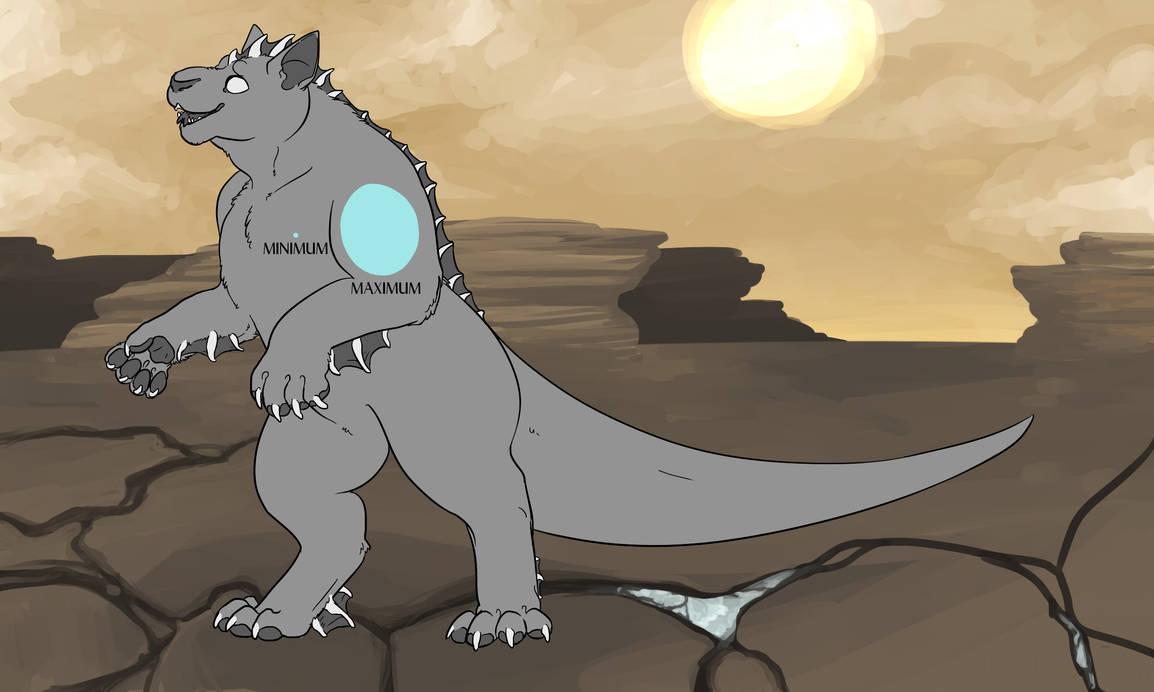
"Speckled Bioluminescence" spots have the same range of size as Inkblot, but most commonly remain small, more like Fawn or even Snowflake. It may cluster together to create larger areas of glow as well.
- Bioluminescence follows the range and edge texturing rules of the marking it modifies. The only thing that changes is the color and that it can glow.
- Bioluminescence overrides the color of the modified marking. It should always be bright, saturated, or pale colors; dark bioluminescence is fairly unheard of, but it can be desaturated (or even white) if it is pale.
- It should also have a soft-edged glow around the marking, this should not stray too far outside the linework of the Ixi. Skin, fins, and the like may also glow.
- Recessive Bioluminescence (nLum) can create Speckled Bioluminescence OR modify one marking. Dominant Bioluminescence (LumLum) can create Speckled Bioluminescent AND/OR modify any number of markings.
Examples:
Topiary (nTopi/TopiTopi) (Rare)
Dominant Topiary can take on an iridescent and/or metallic sheen, and does not have a limit on how many colors can be used in the marking.
- Topiary presents as thin spirals wrapping around part of the Rixixi, and should be inspired in part from filigree designs and/or tree branches, vines, and similar foliage.
- Topiary's shape can vary heavily, but should always contain some form of swirl or spiral, and the general shape of the marking should flow.
- Topiary should not cover more than 50% of a Rixixi.
- Recessive Topiary (nTopi) can be any color, and may be three-toned.
- Dominant Topiary (TopiTopi) may have a metallic or iridescent sheen, and has no limit on how many colors are used in it.
An example of minimal Topiary:
Examples:
Some marking shape examples:
Rixixi examples:
Stained Glass (nSgl/SglSgl) (Rare)
Can either modify a single marking to have Stained Glass patterns, OR present as points with Stained Glass patterns. Dominant Stained Glass can modify multiple markings or modify marking(s) and create Glass Points.
Range:
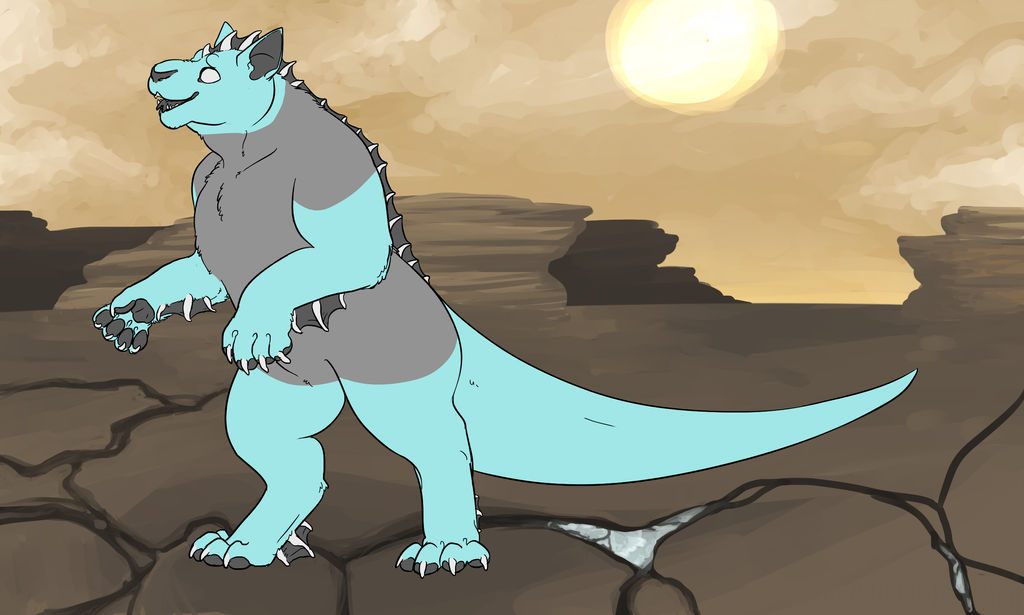

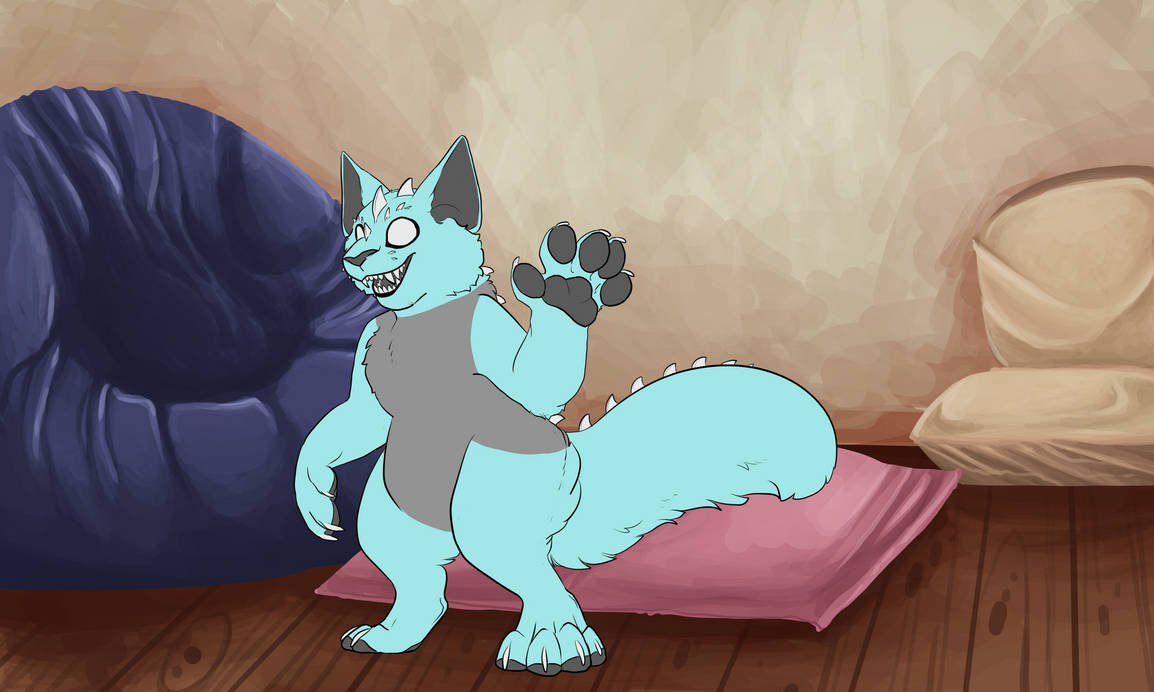
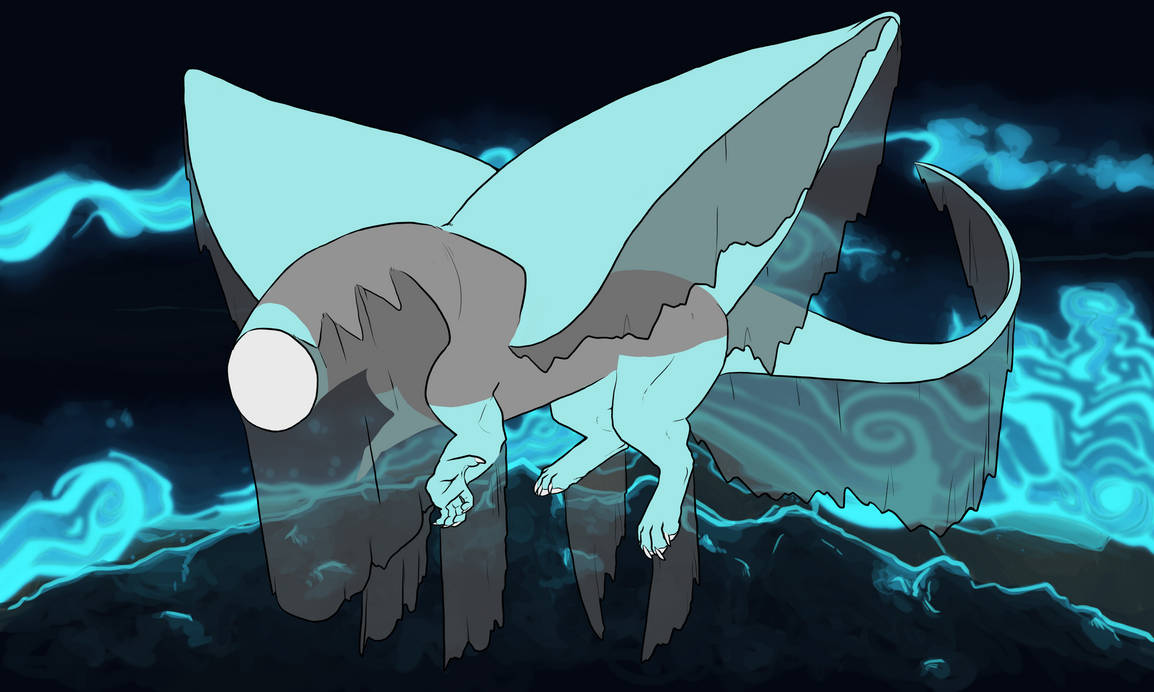
"Glass Points" Stained Glass has the same range as Points; if modifying a marking, it shares the range of the marking.
- Stained Glass follows the range and edge texturing rules of the marking it modifies. It only modifies the color and the internal pattern of the marking.
- The 'border' of Stained Glass should always be black or off-black unless modified by another modifier marking or mutation, but the 'glass' can be any colors.
- Recessive Stained Glass (nSgl) can create Glass Points OR modify one marking. Dominant Stained Glass (SglSgl) can create Glass Points AND/OR modify any number of markings.
- A glassy sheen can be present on top of the marking - this is optional.
Examples:
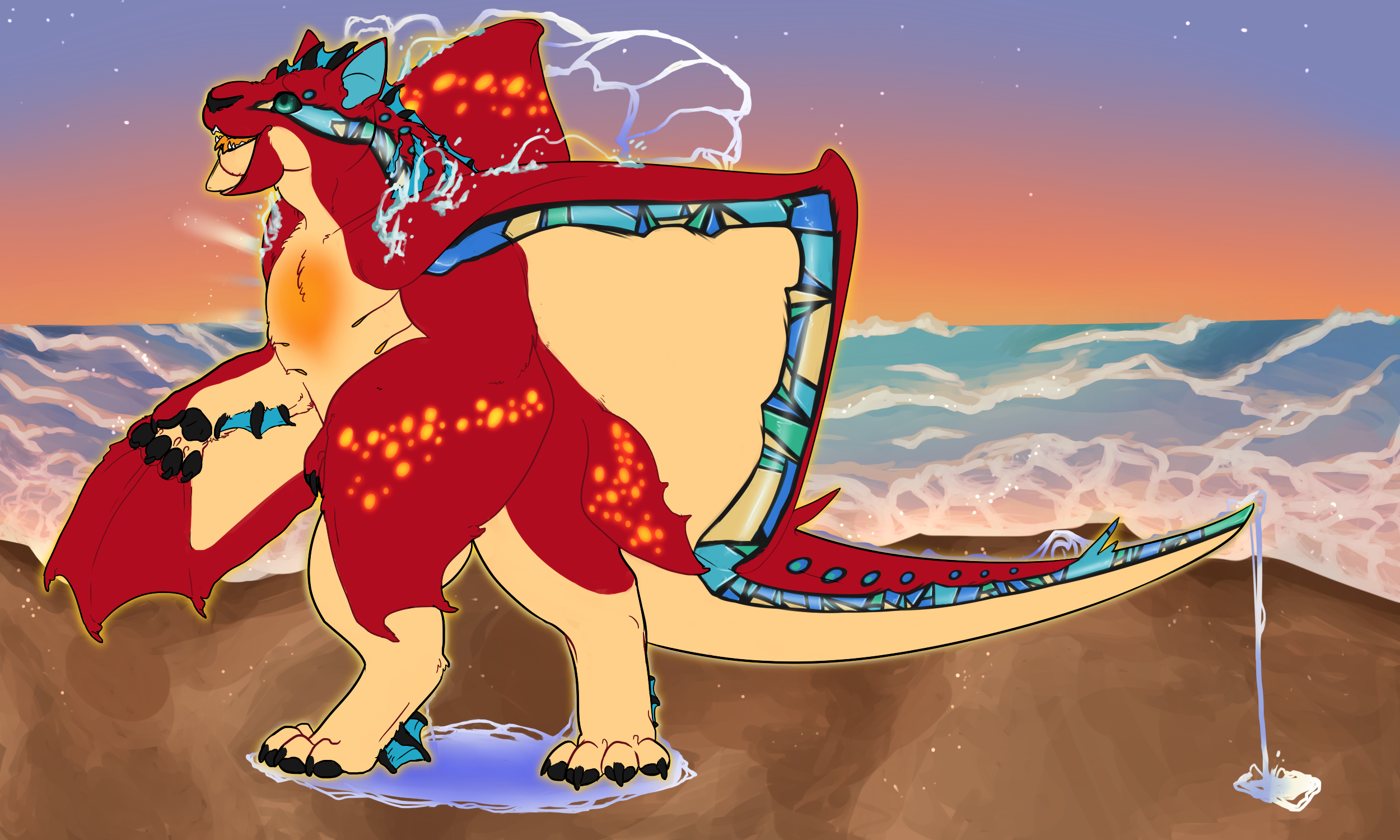
Modifying Skunk - Aurri does have dominant Stained Glass but a design choice was made to have it only affect one marking.
Skypunch (nSky/SkySky) (Rare)
- Skypunch displays over every marking, and optionally can display over color mutations and minimal white.
- Skypunch should be a circle - or roughly circle-like. The color can be that of any sky at all, and can contain things like clouds and weather.
- Dominant Skypunch can alter markings that touch it by changing their color to that of any cloud, either in a gradient or the entire marking. Dominant Skypunch optionally can alter color mutations.
- There should only be one skypunch marking on a Rixixi. There can optionally be two if located on limbs - if this option is taken, the markings should appear on the same pair of limbs (arms, back legs, sleipnir arms, wings, etc.).
- Skypunch can have hard, textured, or soft edges, so long as the shape is clear. The main marking itself should not be blended out (though, as previously mentioned, Dom Skypunch can have a blended gradient effect that affects other markings)
Examples:
Regal (nRgl/RglRgl) (Rare)
Range:
- Regal should be hard-edged, but should also have a soft-edged glow around the marking that should not stray too far outside the linework of the Ixi. Skin, fins, and the like may also glow.
- Regal can be any color except for black or near-black - deeper, bright colors and desaturated colors are okay, and bright colors are the most common.
- Recessive Regal creates a single ring around the upper body, usually looking like a crown shape or a halo, with a trail of some sort coming off of it - a cape shape, bioluminescent dots, lines outlining the general shape of the Ixi, constellations, etc.
- Dominant Regal can create a bioluminescent border around other markings as well, with trails coming off of them and going down the body.
- Regal trails should go down the body towards the tail for the most part, but deviations from this for part of the marking are fine.
Examples:
Painted (nPtd/PtdPtd) (Rare)
Dominant Painted can modify multiple markings or modify marking(s) and the base coat.
- The shape of Painted typically wraps around the body part it presents on, whether on a marking or the base coat, and often appears as wavy, curved, or otherwise slightly imperfect at least to show that it warps around the shape of the body. Sometimes it warps further, creating waves, bumps, even cloudlike patterns in the bands of colors. There is no restriction on edge hardness, but it should not be so blurred as to obscure the signature shape of each band.
- Painted may be lighter or darker than the base coat, lighter or darker than the original marking it modifies, lighter or darker than another marking on the Rixixi, or any combination of the above! It can also be combined with bands of any color of the designer's choosing!
- Recessive Painted (nPtd) can modify the base coat OR modify one marking. Dominant Painted (PtdPtd) can create modify the base coat AND/OR modify any number of markings.
Examples:
Lunar (nLu/LuLu) (Rare)
- Lunar follows the range and shape rules of the markings it modifies: Lunar Unders still covers the range of unders and shouldn't have unnatural cut-outs to it, Lunar Procyonid still has a striped tail.
- Lunar overrides the color and, optionally, the texture of the modified marking. It should be fairly colorful, and can be bright and saturated. Lunar can consist of multiple colors. Shapes and patterns of nebular, celestial bodies, and stars can and should be found within the modified marking. Lunar can modify edge textures: The nebula and galactic shapes can texture the edge of the marking, this can be combined with a blur of color blending outwards underneath the textured segment, this can be seen in Lunar 0007.
- Lunar can optionally create Galactic Markings instead - this follows the same color rules as Lunar applied to another marking, but is applied to its own marking instead. Galactic Markings are typically mostly-shapeless blobs or simple gradients, and can appear anywhere on the body, but should cover a maximum of 75% of the total body space including mutations. Galactic Markings should generally be soft-edged or textured-edged, and the texture may optionally have space themes. Galactic Markings can have the same shape as simple markings, such as Sable, Pangare, Gradient, and Points, but should not take on the shape of complex markings like Tabby.
- Recessive Lunar (nLu) can create Galactic Markings OR modify one marking. Dominant Lunar (LuLu) can create Galactic Markings AND/OR modify any number of markings.
Examples:
Lava Lamp (nLamp/LampLamp) (Rare)
Appears as blobs of color glowing from inside the Rixixi. Can also present as blobs and/or streaks in blood color-altered zones, including skin, fins, etc. Dominant Lava Lamp can display any amount of colors, and can cause the entirety of skin/frills/blood color/etc to glow.
- Lava Lamp can be any color. It can have a gradient, and while it cannot be made up of two entirely different colors in recessive form, the gradient does not have to be subtle as long as the colors making it up are vaguely related. Shading the marking is allowed and recommended!
- The marking is made up of random, medium-to-large blobs around the body, typically based in shape on the floating wax mixture in actual Lava Lamps. There is no restriction on edge hardness as long as the shape can still be made out. It should also have a soft-edged glow around the marking, this should not stray too far outside the linework of the Ixi.
- Due to originating from inside the Rixixi, Lava Lamp can appear partially in the blood of the Rixixi, allowing streaks or blobs of the Lava Lamp color to appear in any marking or mutation altered by the Rixixi's blood color (eg. Daggerstabbed, Wide Vents, E. Porphyria), as well as the skin, frills, etc. Will always be visible inside the Rixixi when paired with Translucent/Partial Translucence.
- Lava Lamp should be translucent when it appears over fur, markings below it should appear at least slightly through it. Lava Lamp markings on skin, frills, and the like can be at full opacity.
- Recessive Lava Lamp (nLamp) creates Lava Lamp blobs of one general color, and also cause streaks and spots of glow in the Rixixi's blood/skin. Dominant Lava Lamp (LampLamp) can create Lava Lamp markings with any amount of colors and also any amount of glow in the Rixixi's blood/skin.
